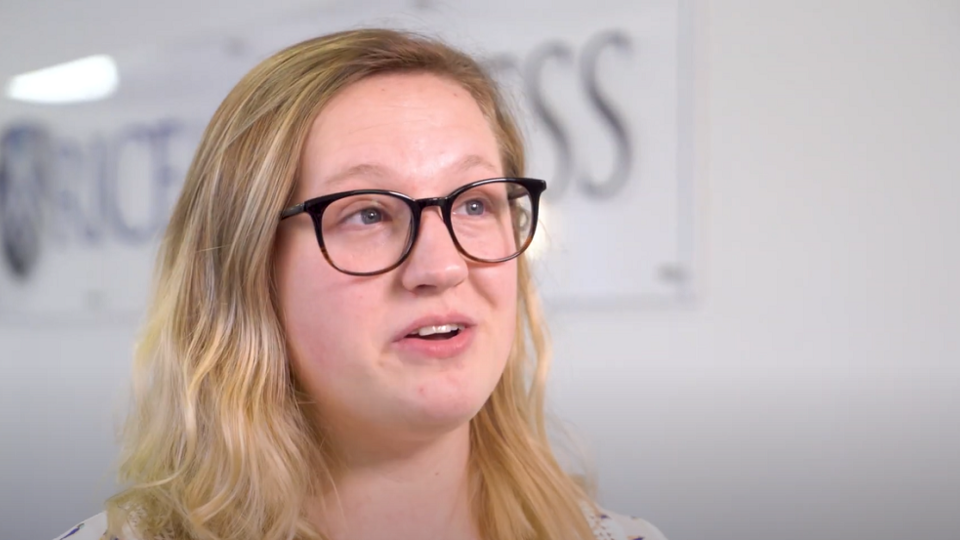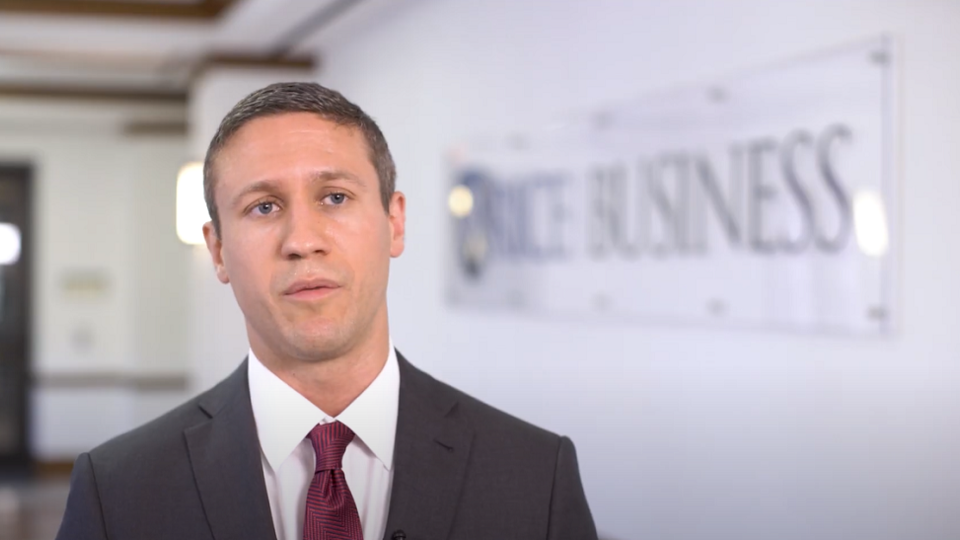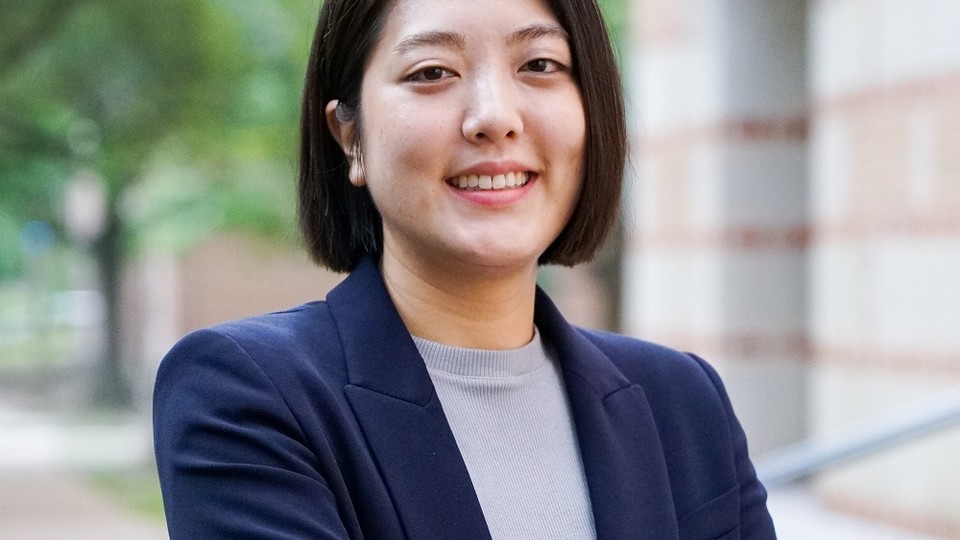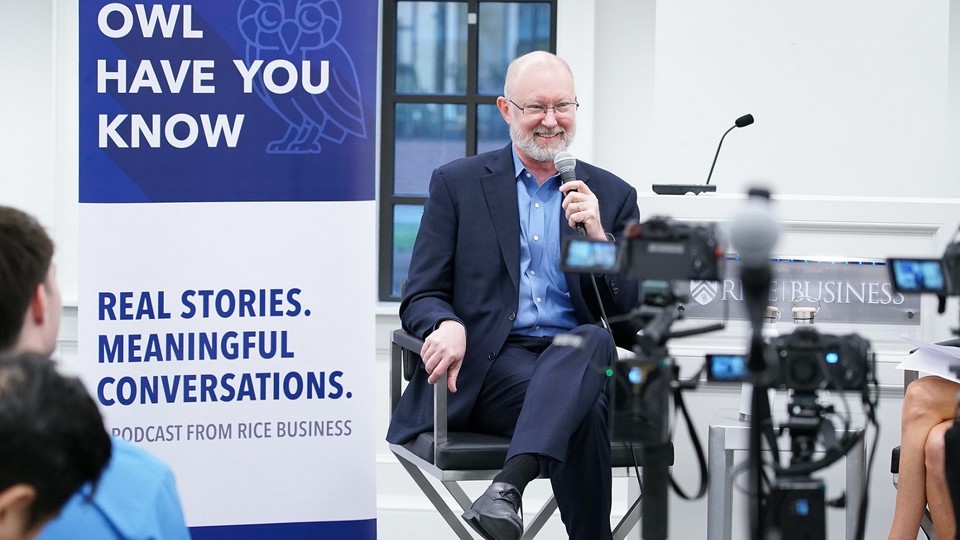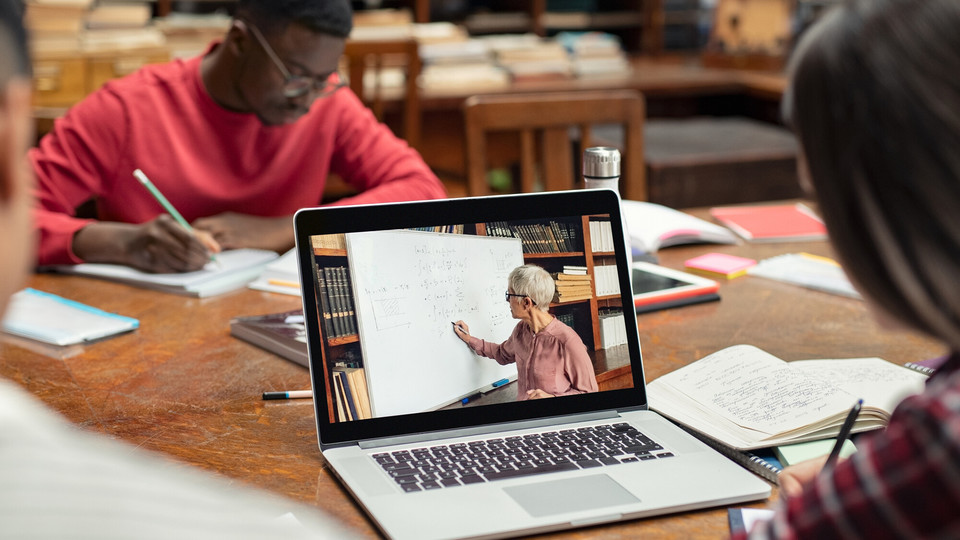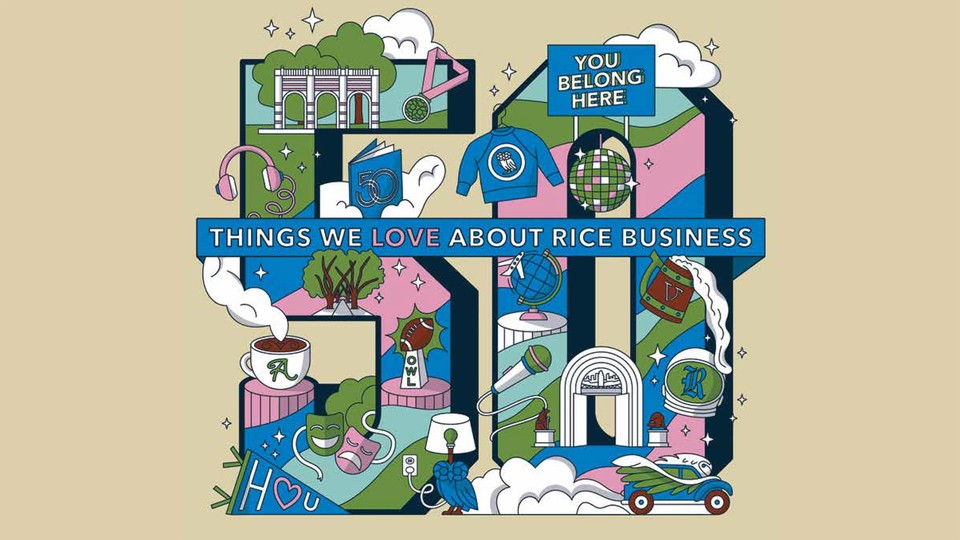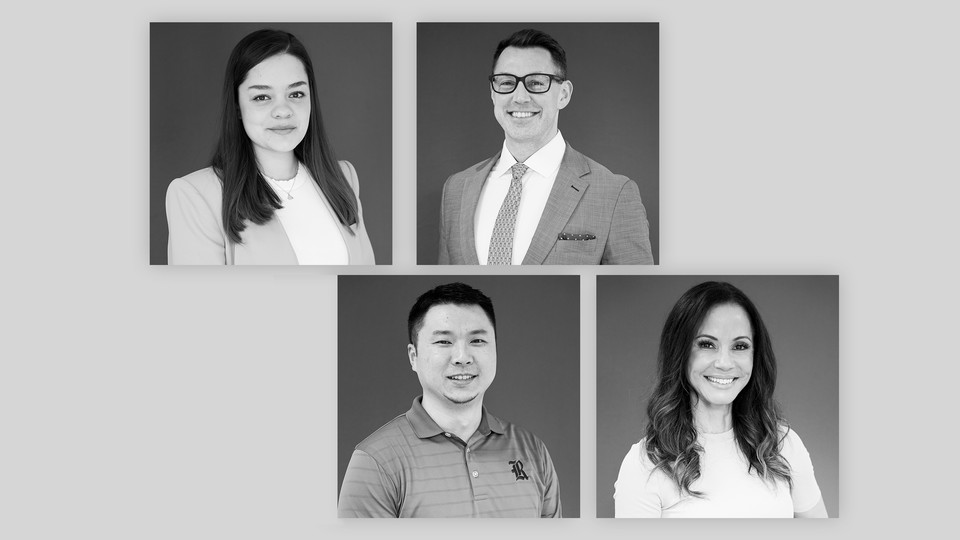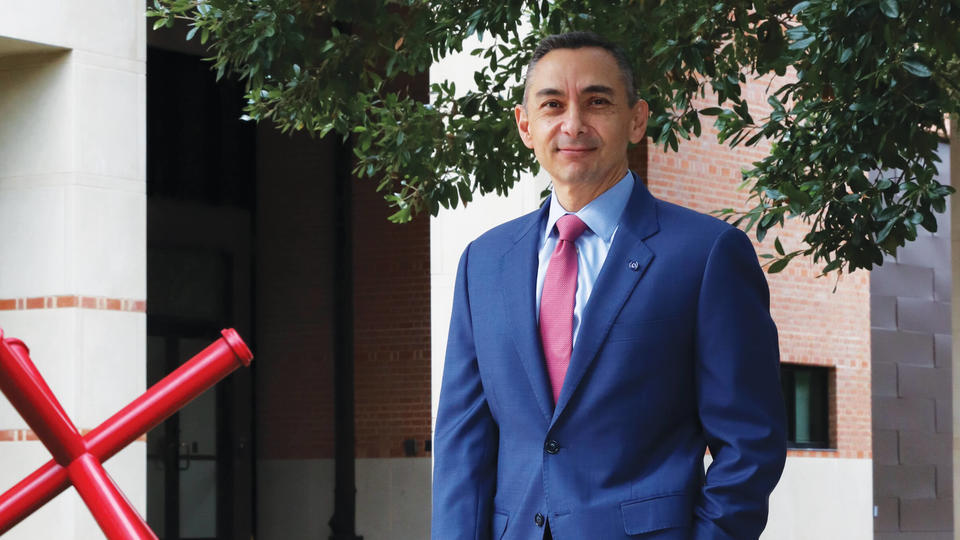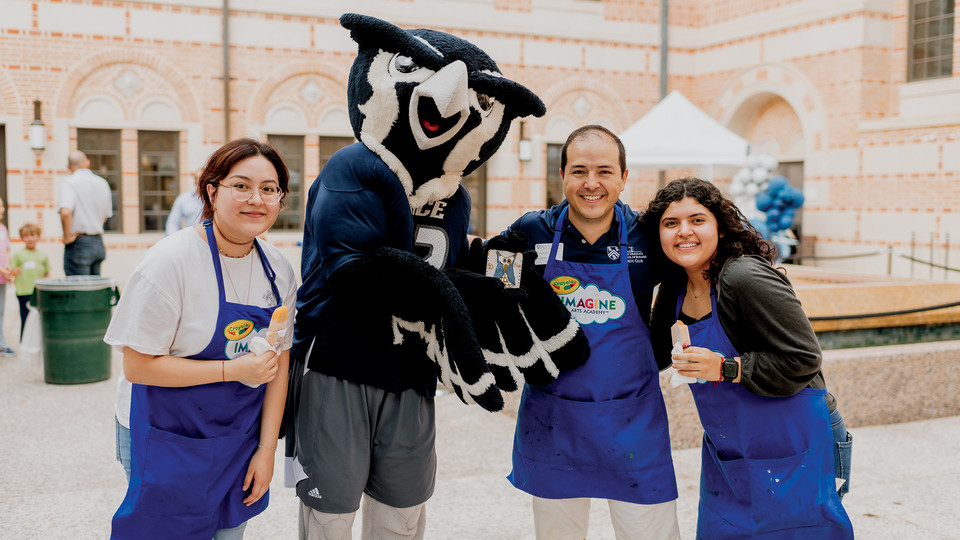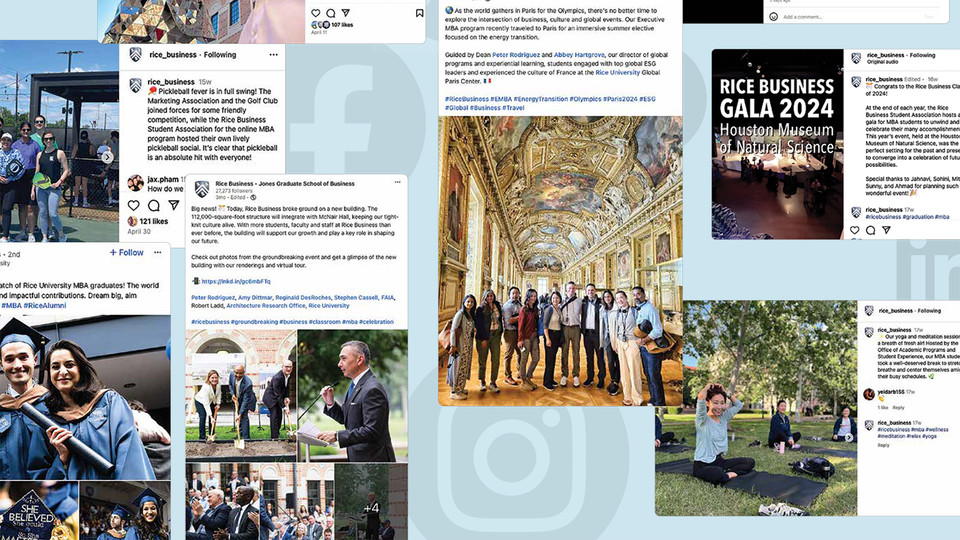Houston’s MBA
Interested in earning an MBA without leaving your job? Learn why young professionals and experienced executives looking for an MBA in Houston choose Rice.


Why Rice is Houston’s Choice for the MBA
Interested in earning an MBA without leaving your job? I love to talk about why young professionals and experienced executives looking for an MBA in Houston choose Rice. The decision for fully employed students hinges on five things:
The Rice Reputation
When I chat with new Professional, Hybrid and Executive MBA students, the first thing they say is that they chose Rice because of its reputation. Everyone in town knows its high standards and rigorous curriculum. When your colleagues find out you’re going to Rice to get your MBA, they know you’ll bring something new to the table. They know your perspective on leadership and creativity will be deeper and broader and that you’ll share what you learn at work the next day.
Lasting Connections
Our MBAs also rave about their smart and savvy classmates. They say how having diverse backgrounds in your cohort or team — both culturally and professionally — generates new approaches to challenging situations. We do that on purpose. It’s not just putting great minds together to build a class. We put great minds together with diverse experiences to open the door for creativity and learning. Those connections extend beyond the classroom too. While you’ve just gained a cohort of new friends, you’re also broadening your network with all Rice alumni.
Our network and reputation are strong within companies in Houston. Making a career change or connection and asking for support throughout your career is easier with a shared Rice degree as your calling card. Careers are long. You want to select a school that will give you the edge your entire career.
Speaking of edge, our No. 1 entrepreneurship ranking continues to connect students and alumni with their big ideas and bigger dreams. Maybe you meet entrepreneurial alums at the Ion in midtown or apply for the Future Founders Summit with the Liu Idea Lab for Innovation & Entrepreneurship. Whatever it is, an entrepreneurial mindset is central to our teaching and your professional tool kit. With Texas being the hottest spot for relocating tech giants lately, you’ll be right in the heart of the entrepreneurship ecosystem with your Houston MBA.
Check out Owl Have You Know, our alumni podcast, and take a deeper dive into some of our alumni opportunities, such as lifelong learning, career services and volunteering.
Interested in Rice Business?
Campus Life
Of course, it’s really hard to make connections without being in person. Now that we’re back on track, our dazzling, tree-lined campus acts as a backdrop while you take classes with Houston’s top professionals, meet with your professors for a beer at Valhalla, go to a baseball game at Reckling Park or a recital at the Shepherd School. Come and explore. Come and relax. Come in person and walk the campus, grab a bite to eat at Brochstein Pavilion and watch the colors change in the James Turrell Skyspace. (Can you tell how much I love this campus?)
Best in Classroom
What happens in the classroom — the rigorous curriculum that everyone talks about — doesn’t just stay in the classroom. What you study is relevant to what you do:
- Data Analysis
- Organizational Behavior
- Operations Management
- Financial Accounting
- Managerial Economics
- Strategic Business Communication
- Other core courses and electives
Your expertise will deepen with each class. And so will your perspective. You’ll share your knowledge, experience, insight and questions with your classmates, not compete with them. You’ll be amazed how much you gain from them and how much you give back in return.
Leading Faculty
The magic can’t happen in class without our expert faculty leading the charge. With 144 faculty members and a 6:1 student-to-faculty ratio, your professors will know your name and be invested in you, your success and your future. Recognized for their scholarship across 11 academic fields, they are publishing research at a staggering rate. So you know you’re getting cutting-edge academic theory and outcomes when your professor stands before the class to teach you something new. Rice Business Wisdom is our online ideas magazine that features summaries of our faculty research so you can read about your professors’ research before you take a class with them. Faculty contributions in research, teaching and service are critical to fulfilling the Rice Business mission.
Your contribution is critical too. If you’re ready to have a conversation about our Professional, Hybrid or Executive MBA programs, contact our office so we can help you make the right decision about where to earn your MBA in Houston. We really believe you belong here.
Keep Exploring
The Flexible Morals of American Voters feat. Professors Minjae Kim & Ezra Zuckerman Sivan
Season 4, Episode 25
Minjae and Ezra dive into their latest collaboration, discussing how personal truths can override objective facts and why misinformation often resonates so strongly with voters.
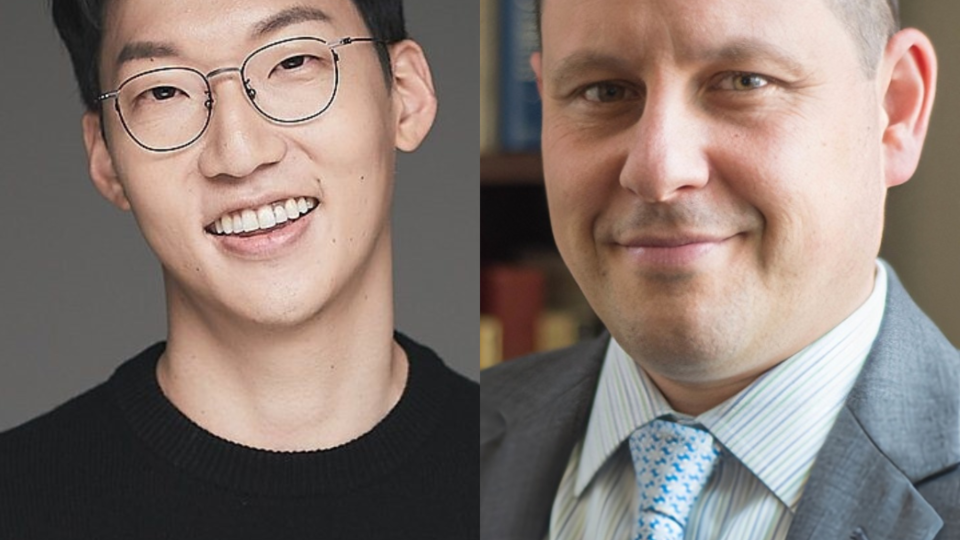
Owl Have You Know
Season 4, Episode 25
Why do American voters support divisive misinformation? That’s the question driving our guests’ latest research, and the focus of today’s episode.
Minjae Kim and Ezra Zuckerman Sivan are experts in sociology and organizational behavior. In this episode, they dive into their latest collaboration, exploring moral flexibility and why some voters are drawn to divisive misinformation. Their new study, “When Truth Trumps Facts: Studies on Partisan Moral Flexibility in American Politics,” will be published in the American Journal of Sociology.
Minjae is an assistant professor of management at Rice Business and Ezra is the Alvin J. Siteman Professor of Strategy and Entrepreneurship at MIT Sloan. Together, they sit down with host Maya Pomroy ’22 to unpack their findings. Listen as they discuss how personal truths can override objective facts and why misinformation often resonates so strongly with voters.
Subscribe to Owl Have You Know on Apple Podcasts, Spotify, Youtube or wherever you find your favorite podcasts.
Episode Transcript
-
[00:00] Maya: Welcome to Owl Have You Know, a podcast from Rice Business. This episode is part of our Up Next series, where faculty researchers and alumni weigh in on the trends currently shaping the world of business. I'm Maya Pomroy. And I have the distinct pleasure of being joined by not one, but two phenomenal guests on the show today, Assistant Professor of Management at the Jones School of Business at Rice University, Dr. Minjae Kim, and Dr. Ezra Zuckerman Sivan, the Alvin J. Siteman Professor of Strategy and Entrepreneurship at MIT Sloan School of Management, who is also the co-founder of MIT Sloan’s Ph.D. program in Economic Sociology.
Thank you both for being here with us today. So, you both have a depth and breadth of expertise in not only management, but sociology, specifically organizational behavior. And you have dedicated yourselves to significant research on the human condition, our psychological motivations, and those sociological implications.
So, today, we're going to discuss your latest collaboration, focusing on flexible morality and a key reason why American voters support divisive misinformation. It's titled, “When Truth Trumps Facts: Studies on Partisan Moral Flexibility in American Politics.” And this is a forthcoming study in the American Journal of Sociology.
So, before we begin, I just want to say that this is a non-partisan study, as flexible morality is evident on both sides of the aisle, I think we can all attest. So, our conversation is going to be about the motivations of the human condition and evaluating personal truth over fact, which can sometimes lead to those mic-drop moments at the Thanksgiving dinner table. So, let's start a bit with your background. So, let's start with you, Ezra. Can you tell me what brought you to really have a passion for this kind of work?
[02:05] Ezra: Sure. Thanks, Maya. It's a pleasure being here. So, I'm a sociologist and was not working on politics for a long time, but I'm the child of a political scientist. That's one piece of background. The second is I have the great privilege of working with fantastic students at MIT.
Minjae is a former student, so are the other two co-authors on this paper, Oliver Hahl, who was a little earlier vintage than Minjae, Oliver and I were on Minjae's dissertation committee, and then the fourth co-author, Ethan Poskanzer, who's at University of Colorado Boulder, who was also a student, and I forget even who was on his committee, but we all, kind of, like, worked together.
You know, one of the pieces of pre-history for this project is a series of papers that, first, Oliver and I, and then Minjae and Oliver, and Oliver and I worked on together. And we were very, very interested in really understanding what sometimes I like to say as, sort of, funky logics of valuation. So, why it is that we value things that we, kind of, shouldn't value?
And that sounds like, what's the “should” coming from? Sometimes, it's actually inconsistent within our own valuation schemes, right? And so, what we were interested in was why is it that people sometimes seem to attribute more authenticity and more warmth to people or institutions who are lower status. So, on the one hand, you're, kind of, raising some people up, and you're taking them down on some other dimensions.
And so, Oliver and I and then Minjae and Oliver and I were doing a lot of work on this. And it's, kind of, a little hard puzzle to figure out. And then right after the 2016 election, one of our other former students, Roman Galperin, actually reached out and said, "You, guys, were right. It's all about authenticity."
And if you can recall back to that time, there was a lot of talk about how one of the reasons that Trump won, and Hillary Clinton lost was that Trump was perceived as being more authentic somehow. And he said, "See, you, guys, are doing all this work on authenticity. And you are right. It's all about authenticity."
[04:06] Maya: Or is it maybe being less scripted?
[04:09] Ezra: So, that was the puzzle I was trying to figure out. How it can be that he would be regarded as more authentic? And the reasons that... you know, first, for us, is I was trying to figure out what's, really, the puzzle here? Why is it hard to understand?
And so, some of it had to do with the fact that one of the reasons that people are regarded as more inauthentic, in general, is that if you're more intrinsically loaded, motivated, or you're more pro-socially motivated, but not if you're, like, seeking fame or fortune, you're extrinsically motivated. That usually makes people seem inauthentic.
And we're going to get into, both sides of the political aisle have their issues, let's say, in the response to the politician and to the various kinds of statements, but let's just say there are people in the world who I think seem more intrinsically motivated than, and more pro-socially motivated than Donald Trump. That was one part of it. But the other part of it is that he has a bit of a challenge with telling the truth.
And actually, within the... And now, we're going to really get into truth versus fact, right? So, let's just say, sticking with the facts, being disappointed about saying things that are only factual, things that would stand up in a court of law, that kind of logic. That's not his game, you might say. And I'm using the word game for a reason because he's playing a different game.
And up to that point, Minjae... I mean, I got to turn to Minjae here for... One of the problems, I'm an advisor, I talk too much. So, Minjae should talk much more than me in this, in this episode. In the large social science literature leading up to that point, I would say there was almost, like, sincerity, you know, you could define as saying things that are only factual, for instance, was centrally regarded as a synonym for authenticity.
You know, that seemed like impossible, basically an impossibility that you could be regarded as insincere and also as authentic. And in fact, one of the first studies we did was a survey. And we showed that Trump voters actually themselves did not see Donald Trump as sincere, did not see him as warm, but did see him as authentic. That's what got us going in this line of research. And that ultimately leads to the study that we're doing today. We're not talking about our first study. We're talking about our second study.
[06:10] Maya: And that first study actually did win a prize. It was the Authentic Appeal of the Lying Demagogue. That's what the title was. Proclaiming the Deeper Truth About Political Illegitimacy. And it won the 2019 Cooley-Mead Prize for best article. So, was that your first collaboration together?
[06:26] Minjae: So, it was actually the second collaboration with Ezra and Oliver Hahl, the former student of Ezra, and, you know, now also one of my committee members. So, kind of, the go off of what Ezra was talking about. I think one of the key things that we really wanted to focus on was that we started with a premise that not only do politicians spread misinformation on all sides of the spectrum, but also, people often, you know, recognize the possibility, very salient possibility, that politicians lie very often.
So, there is literature in the political science talking about how it is actually very hard for politicians to appear authentic. So, one of the key things that we try to get at in that paper with the authentic appeal of the lying demagogue was essentially to identify a specific type of misinformation or specific type of lies that, you know, we label as lying demagoguery that would help that politician appear more authentic versus not under certain kinds of conditions.
So, you know, we thought that, kind of, one of the key motivation was not necessarily that all lies, you know, make politicians appear authentic or, you know, that people thought that, you know, the misinformation was actually factually correct, but, you know, why and... when and why they might see the misinformation as factually incorrect but still, kind of, see the appeal in that. And obviously, that has some, or a lot of relevance to the more recent paper as well.
[07:50] Maya: So, Minjae, what got you interested in this kind of work? And I also want to go back a little bit and talk about how you ended up at Rice and your background.
[07:59] Minjae: So, I always have this insecurity about calling myself a sociologist because even though, you know, I do work in sociology, published in sociology journals, none of my degrees is in sociology. So, my undergrad is in political science, and my Ph.D. is in economic sociology, and more officially in management, working with Ezra and some of other fantastic community members, including Roberto Fernandez, Oliver Hahl, and Kate Kellogg, but at the same time, you know, I always had some interest in politics, too.
As an aspiring grad student, you would apply to different programs. And I applied to MIT Sloan as a graduate student because I saw Ezra Zuckerman and Roberto Fernandez, and I really like them. Also, as a, kind of, undergrad student, you don't really know why you like their work when you're an undergrad student. You're, kind of, like, you have this intuition about how you like their work, but you don't really know why.
[08:51] Maya: That's a very psychological and sociological element as well, isn't it?
[08:56] Minjae: It is, it is. So, I emailed Ezra, and I sent him, like, some of the work that I had done as an undergrad. And he actually emailed me back saying that, "I'm not so sure if it is a good fit yet, you know," because the work that I was doing was just completely different. It was, it was, like, not about, you know, what, what their work that Ezra and Roberto were doing.
And then I later figured out that my work was actually not in that realm that I claimed to have had interest. So, it helped me, that kind of conversation helped me see, like, different types of research and, kind of, connected different types of research with one another, which really, kind of, helped my, kind of, intellectual growth as well.
[09:37] Ezra: That's interesting. You know, it's a very, very interesting process, I think, you know. There's a whole backstory, I think, for every perspective, Ph. D., and Minjae has one, too, about how it is they find out about... probably because also, like, our program is not, like, a degree that is a name brand, kind of, degree.
And so, you, kind of, have to find your way into a little niche, but if any applicant, like you, come in with a certain idea about what research is, and what you like, what you don't like, what kind of standards you want to use, methods you want to use, and then it's a pretty transformative experience. You, kind of, have to be open to transformation. And we never know where things are going. Even, like, the faculty are moving targets, too.
I mean, when Minjae first applied, we certainly didn't know we were going to do this, right? That was something that... It was more part of our community. We were all trying to figure out what's going on. And it related to our research. And so, it was this puzzle that came to us that we all, kind of, rolled up our sleeves and, kind of, really wanted to try to understand.
[10:31] Maya: And so, this is around 2016.
[10:33] Ezra: This, kind of, tributary, or, I mean, river research, kind of, happened, like, two days after the election or something like that.
[10:37] Maya: Ironically, that was, that was the election.
[10:39] Ezra: Yeah, yeah, yeah. That was the prompt.
[10:40] Maya: Yeah.
[10:40] Ezra: And for us, it was probably, like, we are supposed to understand what's going on with this thing about authenticity. And we were like, "Actually, no. We don't understand this at all." I think one of the things that's our principles, and you mentioned about the human condition, right, which is a big, lofty thing, but our reaction right away to that election and to the political dynamics since then and to a lot of dynamics that we see in other parts of the world where there's a lot of similarities to what's been going on in the States, is that we think that pretty much anyone can or would behave the way that voters are behaving.
And our emphasis is always on voters or citizens, not so much on the politicians. We want to understand why it is, sort of, like, the demand side of the political market, why it is that people respond the way they do. And our belief is that there's nothing really different fundamentally, let's say, about Democrats or Republicans. It's more that the situation that they're in.
And that's one of the things that we were very proud about in the first paper is that we got basically both Republican voters and Democrat voters to behave in the same way, depending on how, where they were in experimental conditions. That's always been very important for us.
[11:47] Maya: So, that was the base study that then you could, you know, add into with this study. Let's talk about this study specifically. Can you give me an overview of it? How did you begin?
[11:59] Minjae: So, we essentially start from why do people respond positively to misinformation? There are all different types of misinformation. So, you know, we wanted to focus on a specific type of misinformation that we also focused on in the previous work, which, you know, we often call lying demagoguery, but, kind of, the broader term might be the misinformation that people might actually recognize as based on not true facts.
[12:26] Maya: So, it's their truth, but it's not fact.
[12:29] Minjae: Exactly. So, by the way, we didn't know exactly... you know, we didn't have exact distinction when we started the paper. So, it was, kind of, a learning process as we went on. The technical term for this, and I don't know if it will make it to the podcast, is, “bullshit,” you know.
[12:44] Maya: I think that's great. It should be on the podcast. I think-
[12:47] Minjae: Yeah.
[12:47] Maya: ... everybody understands that word.
[12:49] Minjae: Yeah. So, actually, so, the philosopher, Harry Frankfurt, he came up with this concept that bullshit is... So, there are lies, and there is bullshit.
[12:57] Ezra: You can find him on YouTube, too. He passed away recently, sadly. But when the book came out, he was on Colbert. He was all over the place. It's great stuff.
[13:06] Minjae: And the book is essentially about how the lies, as we colloquially use, the lies are often to mislead people to believe in something that is not factually correct. So, lies often pretend to be, you know, factually correct statement, and which means that even the liars try to often hold the norm of what we call the fact grounding, that people think that it is... they think that it is important to be grounded in on facts.
[13:32] Maya: What I've noticed is, like, if you say something over and over and over again, then people start to believe it, regardless of what it is. Even, you know, my child will sit there and say the same thing over and over. I'm like, "That's not true," but if you say it over and over and over again, it starts to, sort of, overwhelmingly consume you.
[13:51] Minjae: I see. So, I think, I think that's definitely taking place in a lot of types of misinformation. And we actually get some of that, too, which we'll call, like, a factual flexibility. People actually believe the facts behind the misinformation.
But at the same time, we focus on, kind of, the type of misinformation that we, you know, label as bullshit, which, essentially, the people who are saying bullshit, they do not care. They not only don't care if it is grounded on facts, they don't care about the norm of fact grounding that, you know, one is supposed to tell a fact.
[14:22] Maya: Why do they not care?
[14:23] Minjae: I mean, so, that's another thing about, kind of, the... we also focus on the demand side. Like, the politicians who tell such bullshit, like, we don't really know their motivation. They might, you know, they might have more... you know, do them more habitually, or they might, you know, know, strategically speaking, they might know what kind of a reaction that it will evoke, and stuff like that, but that is more of a, kind of, the mystery to us, like, that we, kind of, black box that. Go ahead.
[14:46] Ezra: So, I'd say two things to that, Minjae. That was great. Right. I think if you use the metaphor of a market, right? Think about the political market. So, the politicians are selling something, right? Ultimately, what they're trying to sell you on is to vote for them, right? But they're trying to sell you on something. And ultimately, it's what the market will bear. So, if a particular kind of message is working in one way or another, that's what they'll go with.
They, kind of, surf the crowd. Basically, it's a, it's a, sort of, capitalist political market, right? By figuring out why voters or citizens respond to it the way they do, and you can, sort of, back out why it is the politicians would do what they, what they do, but the short answer is because it works. The second thing is, I just want to, kind of, like, reinforce something that Minjae, I think, was hinting at, which is so we, kind of, take issue with a lot of the way that misinformation is discussed in the media, but also by a lot of social scientists.
And it's a very subtle thing. It's not that we think that they're wrong, but we think we're, sort of, like... by being, kind of, partly right, you miss something really, really, really important. And the “partly right” is that people believe misinformation, you know. If you repeat something, people believe in it. That definitely happens.
Where our view is that people get... people, the media, and other social scientists for the most part, but there's some exceptions, tend to get a little bit too distracted by that fact, the fact that people actually do believe in, like, say, for instance, partisans. Partisan voters do tend to believe what their partisan standard bearers, their candidates are saying.
However, our view is that they don't just believe it, right? They find it compelling in a way that is not exactly, like, they believe it being, to be factual. They think there's a deeper truth that is behind it, or when they do, it doesn't, kind of, matter that much to them whether it's actually factual. And so, in a sense, they don't really believe it.
And our hunch is they can sort... You know what? They won't necessarily admit this. You have to, kind of, get it in a very subtle way, but they can tell the difference. They know the difference between things that are actually well-grounded factually and things that express a deeper truth that they're, kind of, let's say, excited about or maybe pissed off about.
[16:56] Maya: Yeah, that's part of it, I think, the emotional component that triggers people. And they won't budge, you know. The American population is very, very brilliant, smart. Well, in my experience, I've met folks where it doesn't matter. I mean, you could tell them that the sky is blue, and it is green, and it is going to be green forever.
And it's like, okay, I don't... I mean, I can't change your mind, even though they know that the sky is blue, but they'll just keep on telling me it's green. And you just, kind of, go round and round and round until you're just so tired. And you're like, "Okay. Fine. It's green."
[17:32] Minjae: So, yeah. So, one of the things, I think, so, one of the things that we tried to get at through these studies is, like, under what conditions do people say that the sky is green even though they know that it is blue? It's essentially, kind of, our key question. And the key thing that we tried to get at is that it's not because somebody is a Republican or Democrat, or if somebody is conservative or liberal. It's because they are under certain kinds of conditions, and they see this misinformation as taking place in those conditions.
So, that's, kind of, one thing. Another thing that I, kind of, want to add to what Ezra said was I thought it would be useful to, kind of, state the very questions that we asked the online subjects that we ask... you know, show this misinformation. So, we show, kind of, the Trump supporters the statements of misinformation that President Donald Trump has said since we have run these surveys during and after his presidency.
And actually, when we ask the question of whether they think that the statement was made based on objective evidence versus subjective impressions, objective evidence being seven and subjective impressions being one, in four out of the five studies, the people who say that they support Donald Trump and voted for Donald Trump, actually, they're more likely to say that those statements are based on subjective impressions than objective evidence, in four out of five studies.
So, you know, Maya, as you said, they know that, you know, the sky is actually blue, you know. And this is the same when we look at the Democrats as well. And we show the statements by Joe Biden and Representative Alexandria Ocasio-Cortez. So, people often recognize that it is not based on objective evidence, but as you were saying, Maya, they do distinguish it from truth and fact.
So, the question that we try to get at in terms of the truth is, “How true do you think this statement is?” And the people, when they evaluated the statement of misinformation from their own partisan politician, they evaluated the statement to be much more true than based on objective evidence.
[19:36] Maya: And that's also confirmation bias. That's a confirmation bias, is if you already, you know, are aligned.
[19:42] Ezra: It is confirmation bias, but again, it's a little subtle, right? So, as Minjae was saying, so, you're more likely to say it's based on objective evidence, but you're much more likely to say that it's true. That distinction is not a confirmation bias kind of thing, right? Confirmation bias would be, like, I have a set of preconceptions about how the world works, and then I look for confirmation, and then basically reinforce in my belief about facts about the world.
And as Minjae was saying before, we didn't, this part of the study, where there's really two, kind of, main results, and this is one of them, we didn't expect this. We thought people, like Americans generally, use the term fact and truth interchangeably. We found that we don't.
Both Democrats and Republicans don't use facts, or in this case, say objective evidence and truth interchangeably, but you actually have a different standard for what you consider to be true somehow. And it seems to be about, kind of, this deeper sense of truth that isn't necessarily rooted in fact.
And then what people do is, if it's about my side of the political divide, I use a truth standard, and I say... I am more likely to say that it's based on objective evidence than the other side is, even though, like Minjae was saying, not really that much, but I'm really more likely to say, "Oh, yeah. It doesn't really matter so much if it's based on objective evidence. What matters is that it's true," but then...
[21:00] Maya: It's a higher standard. It's a higher standard.
[21:02] Ezra: Well, it depends, you know. The thing is that I flip it. That's the key thing. So, when I'm evaluating the other side... So, if I'm a Trump supporter, I will use the standard of truth to evaluate a Trump statement, but I'll use the standard of objective evidence when evaluating a statement by, say, as Minjae was saying, AOC.
I hold them to a factual standard. And then we flip it, right? So, Democrats hold their own candidates to a truth standard, but they hold, they hold Trump, and we also have one for Ron DeSantis, to a fact standard, right? So, in a sense, the fact standard really is the higher standard.
[21:42] Maya: So, it's different standards, but it's, I mean, apples and oranges. So, you've got apples and oranges. And, you know, you just, sort of, pick and choose based on what your own personal-
[21:52] Ezra: Right.
[21:52] Maya: ... truth is regardless of the facts.
[21:55] Ezra: The facts. Yeah.
[21:56] Minjae: Right. So, again, just to, kind of, put it in a more concrete example. So, one of the, kind of, statements that we showed to Democrats by the President Joe Biden was about vaccination.
And he said the following statement about vaccination, which is, "The unvaccinated, not the vaccinated, the unvaccinated, that's the problem. Everybody talks about freedom and not to have a shot or have a test. Well, guess what? How about patriotism? How about making sure that you're vaccinated so you don't spread the disease to anyone else?" And that's not factually correct in that, you know, even if you're vaccinated, you know, there's a probability, you know, I don't know.
[22:31] Maya: You can still get sick.
[22:31] Minjae: Exactly. And you might still-
[22:33] Maya: Yeah. I mean, I was vaccinated, and I got sick.
[22:35] Minjae: ... you might still spread it to other people. So, we showed it to a lot of different kind of democratic subjects from the online subject pool. And we asked them, kind of, like, "Why do you evaluate the statement as the, as the way that you do?" And one of them says that, "I'm not saying that it is never important for a leader to be based on objective evidence. In many cases, it is essential. However, I believe that there are times when it is more important for a leader to send the right message even if it's not entirely accurate."
[23:05] Maya: So, moral flexibility.
[23:07] Minjae: So, moral flexibility. That... you know, it is important to be, "True," you know, that... you know, which is more consistent with their partisan value than it is based on being factually correct. So, there's a, there's a, kind of, interview by Anderson Cooper with representative Alexandria Ocasio-Cortez a few years ago. I think it was, it was before COVID, you know.
It was after 2016, I think. She expresses this kind of sentiment when Anderson Cooper, kind of, asks, you know, that she is sometimes flexible with facts, sometimes does not state always factually accurate statements. She says something along the line, I don't think it is verbatim, but something along the line about how it is more important to be morally correct, you know.
Although it is important to be factually correct, but it is more important to be morally correct. And I think that communicates much of what we find. And just to be very, very clear, I'm sure that I am also subject to that.
[24:01] Maya: We all are. We all are.
[24:02] Minjae: We all are. We all are. It's not like, you know, people are, kind of, morally corrupt or people are, you know, more upstanding or something like that. We all are. And to some extent, we might even need to be in some situations, but, you know, in this particular case of political misinformation, it does not really help us to get over the political partisanship and, kind of, meet on the same ground based on facts.
[24:27] Maya: We touched on a little bit about... Could you explain the difference between factual flexibility and moral flexibility?
[24:33] Ezra: So, one of the things we do is we ask people in each of these studies. So, they get a statement. And Minjae gave one of those examples. The very first statement we used that was a Trump statement was a statement he made right before the midterm elections in 2018, which was about, you know, a caravan of Middle Easterners who were coming up towards the border. And that was, let's just say, very, very, very loosely based on a pseudo fact. Yeah.
And then more importantly, maybe it's also, like, there was no attempt to try to, like, justify it factually. Like, when Trump makes a statement like that, and when he was in the administration, like, the administration doesn't even try to bother to, like, try to... So, that's, kind of, like, a violation of the norms of... our usual norms of, say, a courtroom, of fact grounding.
[25:18] Maya: Did you find that this is... you know, the golden goose, so to speak, I'm trying to make it sound nicer than it is, of why there's so much divisiveness and alienation and... You know, is that what it is, is that it's not the same standard? It's not the same test. It's a, it's a higher degree of fact as opposed to belief. So, is that the reason that there's so much divisiveness and anger, really, and people can't talk to each other anymore.
You know, what I've noticed, and I'm sure everybody on the planet has, is that you just, sort of, stay away from that because you don't want to open up a box of wasps that's going to come and attack you. And so, without that discourse, aren't we losing, really, what this country is based on is this political discourse that we have this freedom, but because of this divisiveness and these different standards, that we're losing, sort of, who we are in the midst of all of it.
[26:25] Minjae: So, the short answer is that we don't have an exact answer to that question, but I browse academic Twitter a little bit. There's a philosopher, whose name I'm forgetting. He put it in a term that I thought was really insightful, which is that misinformation may be a symptom and not necessarily a cause of this, kind of, the political divide.
The fact that people are so divided, and there is already populist politics, which, kind of, gives a rise to this, kind of, misinformation, but at the same time, I'm sure that it might still feed back into being a cause of this deeper political divide based on which, you know, when people don't agree on facts and what is important, they might never be able to agree on what policy to implement, for example.
[27:09] Maya: So, what's the cause? Big question.
[27:12] Ezra: So, I agree with Minjae. I think it's probably more symptom than cause. We don't know. It maybe reinforces, though. Like you're saying, Maya, it can't be good if you can't actually have... be on the same page and talk about the things you really talk about, right, which is, I think, what you're speaking to, Maya, is somehow get to those deeper truths, right? So, there's a narrative that's very, I think, popular on the right in America about what's wrong with America.
And there's narratives on the left, you know, that are deep narratives about what's wrong with America. And those are very different narratives. And that's what people... when you express those deeper truths, those narratives, is what gets people on each side, kind of, excited without necessarily being so grounded in facts, but then can we actually have a conversation about what those narratives are and reconcile those? That seems to be really hard.
In our previous paper, what we did was we created, kind of, like, a simulated version of an American political moment in which we created a situation. Like, it's like it was a campus election in which there were two ways of creating what's known by political sociologists as a legitimacy crisis that made people feel like the system was illegitimate in some way. And one way was through making it seem like the establishment politicians were corrupt, right?
So, think about some of our current politics and when that's mentioned, right? And the second was about making it seem like the establishment was favoring some groups over others, upstart groups. So, when we created those conditions, that's when people got excited about and found a lying demagogue authentic.
And it's when they made statements that were essentially, kind of, like, a little bit of a dog whistle about those narratives. That's what these statements, sort of, do. I would say, you know, getting to the truth of those grievances, those grievances exist on both right and left, and trying to get a discourse about them-
[29:07] Maya: And fester.
[29:07] Ezra: ... they totally fester.
[29:07] Maya: They fester.
[29:08] Ezra: Yeah, yeah, yeah. And this, kind of, discourse reinforces it rather than actually addresses them. That's our challenge is getting to a discourse about those narratives.
[29:16] Maya: Well, and one thing that you said is that I think everybody has their ideas of what's wrong with America, right? Both sides. This is wrong, and this is wrong, but nobody seems to be focusing on, okay, this is wrong, and this is wrong. Let's talk about what's right, right? Let's talk about how we're more alike than we are different, you know. And I think that's what's missing.
And that's what I think a lot of people are really aching for today is that, you know, let's talk about how... you know, all the good that we have in this country. And I think that that's the focus is this is wrong, and this is wrong, and I don't believe this, and I don't believe that, rather than, "Hey, we're Americans."
[29:55] Ezra: So, here's something that might be both a source of hope, like you were saying, building what you were saying, Maya, though also, to me, troublesome, which is Minjae and I are both in schools of management. So, we have a little bit of perspective on the economy.
And so, I think the economy, the American economy, is a place where Americans of all types meet each other, and do business with each other, do all kinds of creative, exciting things together. And it is quite robust. Now, it has challenges. But if you look at the state of the American economy, especially compared to, to the rest of the world, the American economy is doing fantastically well. Now, that doesn't mean it doesn't have troubles.
And now, I'm going to get into trouble a little bit because, like, this is one of the things that is very different across the partisan divide, though, actually, I think both on right and left, people are complaining about the economy. You ask most economists, you ask most business school professors, people seem to be complaining about the economy more than they should.
So, we're back to a little bit of the, you know, gap between some kind of sense of truth and facts. And also, there are people who are really clearly suffering in this economy. But the American economy, and there was a great jobs report that came out just now, like, shows you that Americans, even despite our divide and our different narratives, at least about politics, can do great things together. And so, maybe that's a source of hope.
[31:10] Maya: Absolutely, it's a source of hope. And I'm wondering, based on history, because that was one of my questions as well when I read the study was, has this happened before? And is social media the reasoning behind this or not?
[31:25] Minjae: So, on the, on, kind of, the more contemporaneous example and perhaps example that, you know, not to trivialize this issue, but one of the things that I often talk about, that two people... when we talk about this example, is that we often tell the story to young kids or, you know, babies about how Santa Claus is there. The gift that you get on the Christmas morning is a, is a Santa Claus drops off the gifts under the tree overnight.
[31:53] Maya: And he comes down the chimney, which is really scary.
[31:56] Minjae: The chimney, you know. And, you know, there all, kind of, the related factually incorrect statements that are made to the kids. But people of, you know, many different backgrounds endorse that statement because they agree what the underlying truth, in this case, kind of, to keep the pristine, the magic of the holiday, magic of Christmas to the young kids.
[32:24] Maya: Until they find out that it's not true. That's the worst day ever.
[32:29] Minjae: So, I think the hope that Ezra is mentioning, and which I also share essentially, that when people... even if there is some kind of separation between the facts and truth that people recognize as, that if they can agree what, kind of, the goal that they should seek out for, then, you know, there might be... this divide might not necessarily be a hurdle.
That said, we don't know if it is easier to arrive in the same goal or if it is easier to arrive at the same facts. We don't really know which one is easier. So, the prescription would have to depend a little bit on that. But, you know, the economic goal might be, kind of, one of them, so it could be, but yeah, that's...
[33:10] Maya: Economics is always a shared goal, you know. Like, let's bring it back to business. And that's true. It's the quality of life. It's the quality of life that you have.
[33:19] Minjae: That's right.
[33:19] Maya: And Ezra said, you know, the U.S. population and the American economy is, at this moment, doing significantly better than most. And that is one source of where we can agree. And we can agree to disagree on some things, but, you know, everybody wants to be able to feed their children and have homes and be able to go to the grocery store and be able to live in a peaceful, safe environment, those basic needs.
[33:47] Ezra: And that's at a base level, but we also, I think, hope... and Minjae was saying, I think, we don't know exactly how to get there, but we do hope that... like Minjae was saying about himself, I say it's true for me, too. What this paper has done is made me reflect on when I basically shift standards and use a higher standard the other side than I use for myself, whatever, kind of, divide I'm in.
And we, kind of, hoping that people, if you read this paper, you think about it. You reflect on, like, "Maybe I can be a little more consistent in the standards that I'm holding and not hold my rivals, opponents, the other side of the Thanksgiving table," as you're saying, Maya, "to a higher standard that I hold myself to and my side to." We're not sure how to get there, but we're hoping that we can get there.
[34:34] Maya: One of my questions is, when has this happened in the past?
[34:36] Ezra: So, I'm not an expert in Texas politics, but there's several great chapters in one of the volumes by Robert Caro, his multi-volume series on LBJ. And if you read that volume, it's really eye opening. So, this is about the 1948 Senate election. And there's a series of chapters there. It's most notorious for a famous boat stealing, a thing that happened down in the Rio Grande.
But I think from contemporary politics, what's most interesting is that in that, you know, describes, actually this is all, I think, preceded LBJ, it was a part of Texas politics at the time, was two features that we associate today with contemporary politics were very well-known back then. One of them is fake news. And so, you know, he put out, kind of, a very professional-looking newspaper that was meant to look like a real newspaper.
And you can think about the environment back then, very, very rural, very large state. And so, getting the word out was not easy. It was, I think, called the Johnson Gazette or something, but it was like one tool that he used very, very well, but like I said, it was just part of Texas politics that he didn't invent. And the second, which I think is the most interesting, is he used something that was also the pre-existence of him, which was known as missionaries.
And these were men who were known in local communities. And Caro describes essentially very immigrant-dominated communities, I think German speaking or Czech speaking, and maybe some others, in which you would basically pay a guy who hung around the town square.
And that guy presented himself as just a guy who happened to know about this congressman, you know, out in Hill Country, you know, near Austin, that was a great guy. "And you didn't hear about him. You know, Lyndon, he's a young guy, but he's going places. And he's my boy, Lyndon." That, kind of, thing. And this is, kind of, the equivalent of what today we notice, like, Twitter bots, right?
People who present political ideas and present themselves as being, kind of, neutral, but in fact are agents, right, are tools. And that's probably as old as politics, in one way or another. And so, to me, when I read that, and I share that with my students, kind of, does clue you into, yeah, things change and things get worse, but actually, some of this stuff is things we've been... that have been part of our politics for a long, long time, and that. And by the way LBJ was a Democrat. Don't tell anybody.
[36:53] Maya: Sure. No, that's why I thought it was an interesting story because it isn't Republican or Democrat or Independent or anything. It's just human nature and...
[37:04] Ezra: Yeah. And the incentives of politics.
[37:05] Maya: Since the beginning of time.
[37:07] Minjae: Some of the, kind of, the intervention work that, on this topic, has been done by other researchers, not by us, but some of the other researchers, including people like Jan Boeckel and James Chu and Robb Willer, who come out of this, kind of, project called the Strengthening Democracy Challenge.
And they have done, you know, a lot of work, both, you know, in the lab setting and also in the, in the field experiment, meaning that they actually have the real people come in and do different types of intervention in order to make sure that they come closer in their... you know, how they perceive facts and how they perceive truth and how they see one another and stuff like that. So, there are, there are lots of projects that come out of this that are related to this and that should be relevant to our conversation as well.
[37:49] Maya: Sure. And recognizing and being open to understanding that this is happening. And once you recognize the problem, then you can start thinking about the solutions in anything in life, you know, but step one is recognition, right? And so, one of my last questions is... I guess, we don't know what the answer is on how to solve it other than this is a study.
It's an impartial study. This is what we see. This is happening. This is fact. This is fact. And you can interpret it however way you want to, weaving in your own truth, but these are the facts. We don't know what the future holds, but what are your hopes of what your study... how it will help our society?
[38:33] Ezra: I would say, a little bit what I said already, is that I hope it gets at least some self-reflection, that people are realizing that they're using different standards for themselves and for others. And actually, one of the things I hope is, like, this is just the beginning research for us. We hopefully have a lot of people build on our research. I see a lot of areas of application where people are using different standards in different ways.
You can see it, I would say, in a lot of the tumult since October 7th on our campuses. People are using very different standards on each side of the divide, again, holding the other side to much higher standards than you're holding yourself to in the statements that you're making. And so, my hope is that, somehow, we get to be a little more reflective about these things and apply those lessons and maybe take the temperature down in our politics because of that.
[39:19] Maya: Yes. Temperature down sounds like a good plan. And that would definitely... that's something that I'm hoping for ourselves and for future generations as well. So, Minjae, what's next for you? I know that you have done a lot of other really interesting and unique studies.
[39:35] Minjae: So, on some of what's next on my plate is related to, kind of, your question as well. Like, under what kind of conditions do people actually come together, and when and why they might, you know, take this temperature down? I'm, you know, optimistic about... perhaps not completely optimistic, but somewhat hopeful about this, partly because, you know, insofar, as there's this distance between facts and truth and, you know, people of different partisan sides, they can't meet in the middle round because they disagree on what the, what the truth should be, then there should be some, kind of, you know, political entrepreneurs, so to speak, some of those who try to bridge those gaps for their own good, for their own strategic good.
And they might profit off of it. And so, it might be more individually motivated, but that might be good for the collective and for the whole society as well. So, me and my another co-author, we're trying to get at, essentially, kind of, conditions under which that might be happening. And this is very much still research in progress, but that's some of what's on my plate.
[40:34] Maya: Well, that's very exciting. And we certainly look forward to that. This has been a fascinating discussion. And I've learned a lot. And I hope that our listeners do as well. The study Flexible Morals: A Key Reason American Voters Support Divisive Misinformation will be in the American Journal of Sociology. And we look forward to more of your research and more of your work. And we want to thank both of you for being on the program.
[41:01] Ezra: Been a pleasure, Maya. Go, Owls!
[41:03] Minjae: Thank you very much.
[41:06] Maya: Thanks for listening. This has been Owl Have You Know, a production of Rice Business. You can find more information about our guests, hosts, and announcements on our website, business.rice.edu. Please subscribe and leave a rating wherever you find your favorite podcasts. We'd love to hear what you think. The hosts of Owl Have You Know are myself, Maya Pomroy, and Scott Gale.
You May Also Like
Houston scores top ranking of best cities for entrepreneurs
Houston joins Dallas and Austin in a new ranking of the 10 best U.S. cities for entrepreneurs to live, with Rice Business's #1 graduate entreprenership program ranking making a big impact.

Rice Business gala honors 50 years of empowering leaders, celebrates future growth
In a dazzling celebration of five decades of innovation and achievement, the Jesse H. Jones Graduate School of Business at Rice University held a gala Sept. 26, uniting board members, faculty, staff, alumni and community partners.
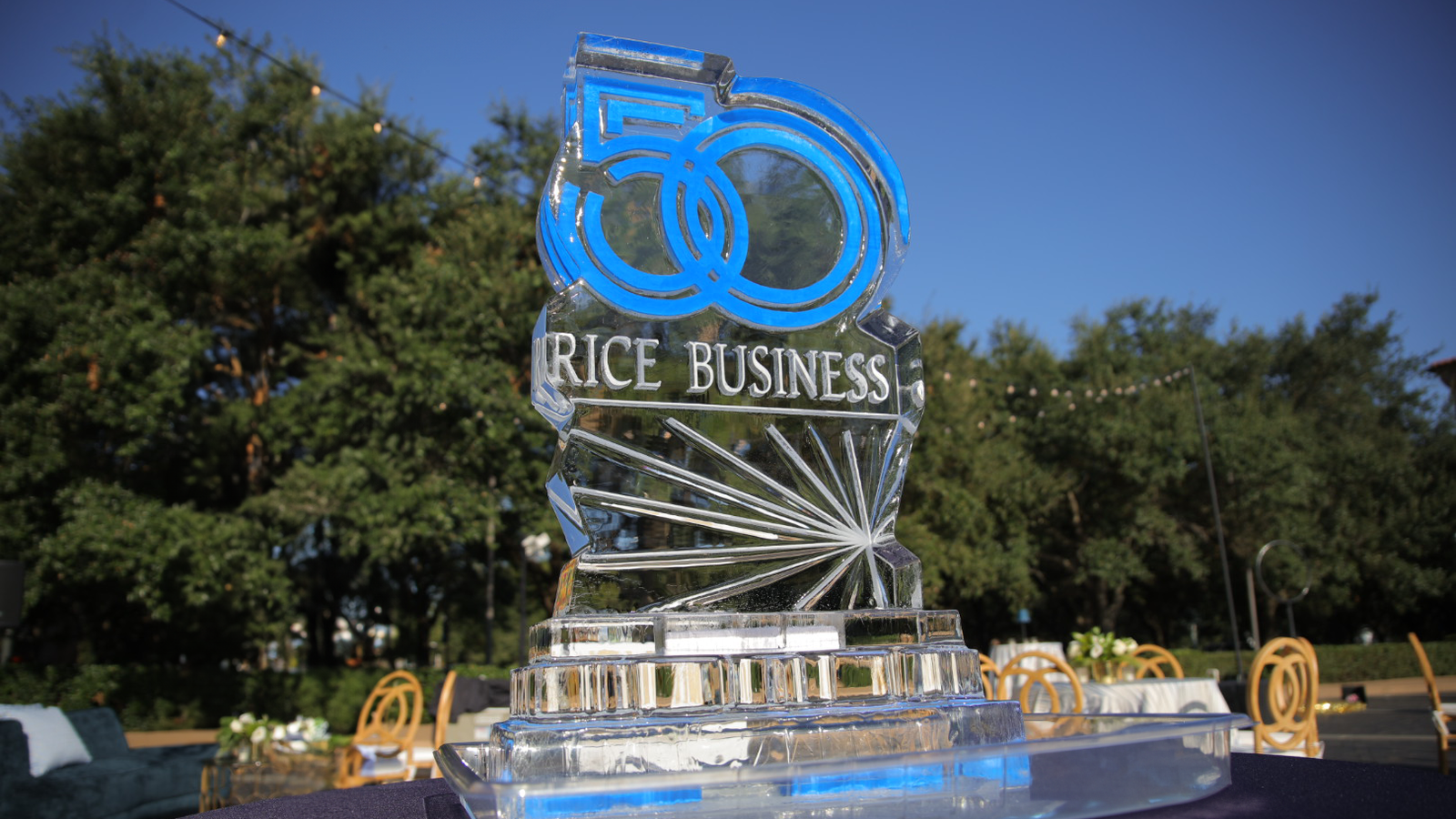
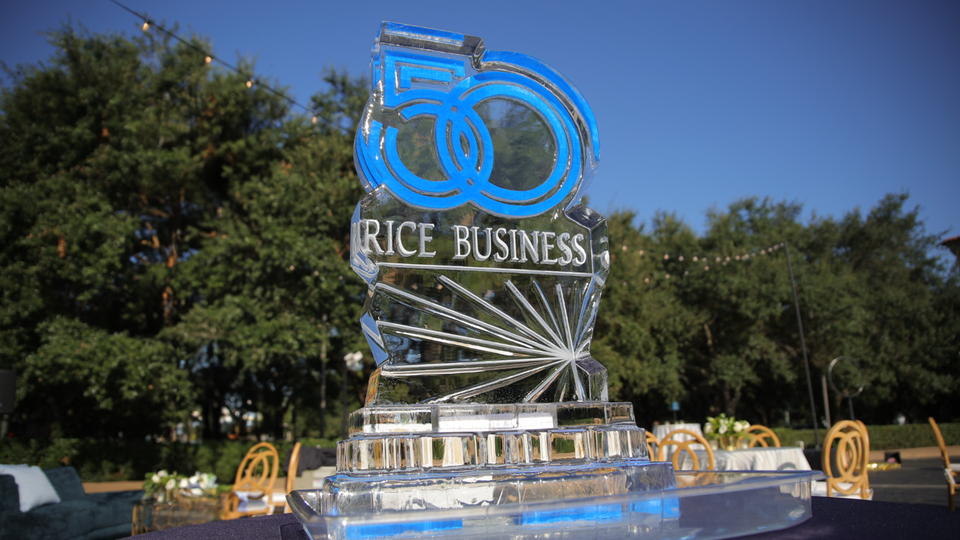
In a dazzling celebration of five decades of innovation and achievement, the Jesse H. Jones Graduate School of Business at Rice University held a gala Sept. 26, uniting board members, faculty, staff, alumni and community partners. The event celebrated 50 years of growth and looked ahead to the future, including plans for a new 112,000-square-foot building to accommodate significant population and program expansion over the past decade. The school has increased faculty by 41% to support its new programs and growing student enrollment from a new undergraduate business major, an increased cohort to the Full-time MBA program as well as the MBA@Rice and Hybrid MBA, both of which have multiple on-campus residentials each year.
“This school has come a long way since it opened,” said Rice President Reginald DesRoches in his remarks. “The graduate program continues to garner great recognition and is an increasingly important program for numerous industries in the Houston community. It also now produces more MBAs than any other program in Texas. The undergraduate business degree, launched just a few years ago, is rapidly becoming one of the most widely sought-after majors on campus.”
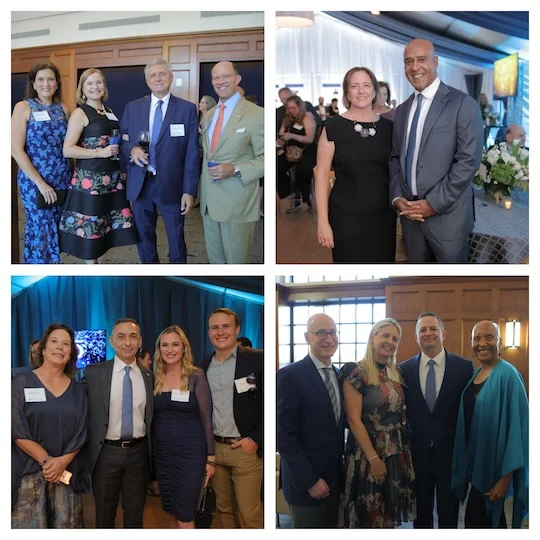
Established in 1974 with a significant gift from Houston Endowment Inc., founded by Jesse Holman Jones and his wife, Rice Business began as a small school with two degree options and a handful of passionate faculty. It has since expanded its offerings to include executive education, professional MBAs, undergraduate degrees and doctorate programs. The school’s mission to focus on creating a community that inspires leadership and innovation has resulted in top national and international rankings.
“Since its founding, the Jones School has stood as a beacon of excellence, embodying the spirit of innovation, collaboration and intellectual rigor that defines Rice,” DesRoches said. “It has been instrumental in preparing generations of leaders to tackle the complex challenges of the business world with integrity, insight and ingenuity. The school’s commitment to producing socially conscious leaders has reverberated across industries, and I couldn’t be prouder of the legacy it continues to build.
“At the heart of this success is the outstanding faculty at the Jones School. These scholars are not only educators; they are thought leaders whose research and scholarship have influenced business practices and policies on a global scale. Their work pushes the boundaries of knowledge, shaping how we think about everything from entrepreneurship and finance to leadership and corporate responsibility. The dedication and impact of our faculty are fundamental to the reputation and success of this institution.”
The gala featured live entertainment, cocktails and hors d’oeuvres in the Jamail Plaza that features an iconic fountain with signage that showcased the history of the school in detail for guests. A surprise appearance by state Rep. Ann Johnson wowed the audience with a state of Texas proclamation congratulating the school on its success.
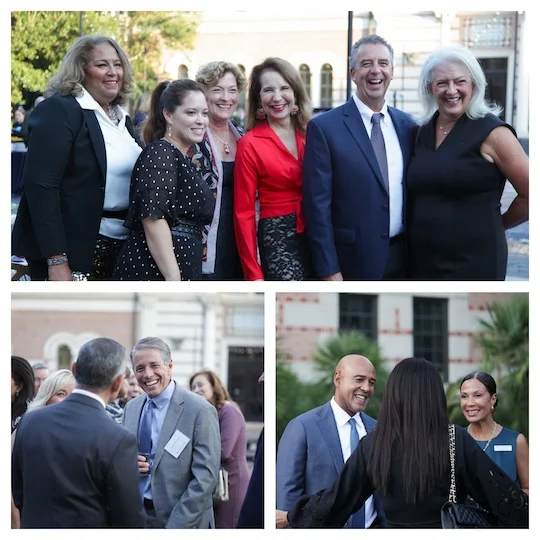
To accommodate its continued growth, Rice Business’ building expansion will feature state-of-the-art classrooms, modern office spaces and vibrant amenities such as dining areas, open gathering spaces and facilities for events like the Rice Business Plan Competition, Rice Energy Finance Summit and the Women in Leadership Conference. The new building will seamlessly integrate with McNair Hall — the current home of Rice Business — enhancing the campus environment and continuing to cultivate a collaborative culture that addresses real-world issues.
“Our city, state, nation and world face complex challenges in energy and sustainability, health and health care, urban thriving and responsible artificial intelligence,” said Amy Dittmar, Howard R. Hughes Provost and executive vice president for academic affairs who also serves as professor of finance and economics. “Rice Business faculty and graduates are developing multifaceted solutions to these issues as well as laying the groundwork to solve problems that we haven’t even thought of yet.
“This level of problem-solving requires an entrepreneurial mindset, so it’s a good thing the Jones School of Business has had the No.1 graduate entrepreneurship program in the Princeton Review and Entrepreneurship Magazine for five consecutive years and top MBA programs for finance and consulting. Challenges of the scale we’re facing require substantial capital and a strategic, coordinated approach.”
Recent business faculty research highlights important and timely topics such as the reduction of plastic waste, the role of methane emissions in curbing climate change, inefficiency of discrimination, unconventional ways to improve economic mobility, the effectiveness of methods to slow teen vaping and optimizing resources to enhance public education. It’s not just the faculty that produces research — in only a few years since the undergraduate major launched, Rice Business students are impressively applying cutting-edge applications of AI and machine learning in the world of business, Dittmar said.
“I can’t imagine a better school or a better university to build the leaders who will tackle those issues head on,” said Rice Business Dean Peter Rodriguez. “These challenges must be met by critical thinkers trained by world-class researchers and supported by world-class research networks. Now this is the good news. We’ve been sending those kinds of graduates out into the world for five decades, and we’ve been doing so with the guidance of incredible faculty who are top-tier researchers and gifted teachers.”
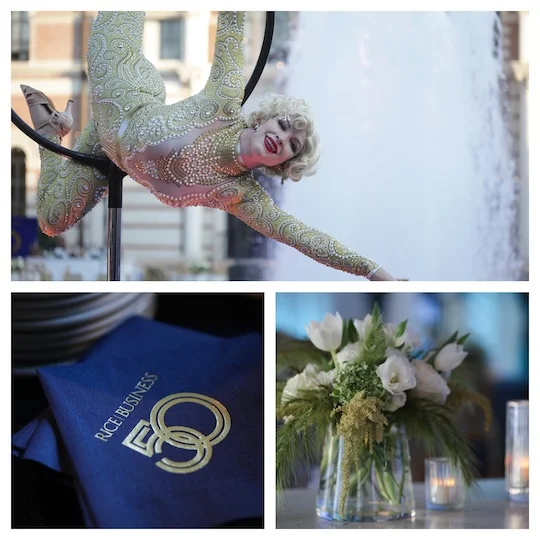
Since joining in 2016, Rodriguez has launched four new programs — MBA@Rice, a hybrid MBA, an entrepreneurship minor and an undergraduate business major — addressing the complexities of the modern business landscape. The undergraduate business major, which graduated its first class in May, quickly became one of the most popular majors on campus. Rodriguez, who is also a professor of strategic management, teaches MBA classes on leadership and has instilled the core values of being attentive, responsive and kind as central to the culture of Rice Business.
“Our commitment to entrepreneurship and innovation and to leading the energy transition means that Rice Business graduates and faculty will have seats at the table with the world’s leading organizations as they create innovative solutions to complicated problems,” he said. “But what makes me the most proud is that our graduates and faculty will be at those tables with the degrees that taught them that rigorous thinking, open dialogue, inclusivity and global perspectives are what really matter.”
As dean of Rice Business, Rodriguez also has doubled MBA enrollment, grown tenure-track faculty by more than 35%, renovated McNair Hall, including a new public art project, and helped the Rice Business community survive Hurricane Harvey and grow stronger during the COVID-19 pandemic. He also ushered in a new Office of Diversity, Equity and Inclusion, a relationship with the Consortium for Graduate Studies in Management and a rise in underrepresented minority students. He established an operations faculty group, led the successful and growing entrepreneurship initiatives at Rice and built into the curriculum a global field experience for every student.
“I envision that 50 years from now, Rice’s Jones School leadership, alumni and faculty will be standing in what I am sure will still be a beautiful but perhaps not so ‘new’ building celebrating the historic and groundbreaking accomplishments our faculty and students are working toward today at the frontier of business,” Dittmar said.
You May Also Like

Rice University’s Jesse H. Jones Graduate School of Business today announced the launch of its Graduate Certificate in Healthcare Management program, a 10-month, credit-bearing professional credential designed for current and aspiring leaders seeking deep expertise in the business of healthcare.
Action Items
How buying broccoli can help get you a loan

How Buying Broccoli and Beans Could Help You Get a Loan

Millions of people in the U.S. struggle to get loans because they lack a traditional credit score. But new research by assistant professor of marketing Jung Youn Lee, along with colleagues at Notre Dame and Northwestern, has uncovered an unexpected tool that could change the game: grocery shopping data.
1. Using grocery data to assess creditworthiness
- Lenders can look at what groceries consumers purchase to predict their likelihood of paying back loans. Healthy food items like fresh milk, yogurt, fruits and vegetables correlate with timely bill payments.
- Shoppers who buy cigarettes, energy drinks and canned meat are more likely to miss payments.
2. Looking for consistent shopping behavior
- People who pay their credit card bills on time tend to shop on the same day of the week. They also spend similar amounts monthly and stick to the same brands and products.
3. Boosting credit approval rates
- Lenders can improve risk assessment by incorporating grocery data into their decision-making process. This approach can increase the accuracy of credit risk predictions and boost profits.
- In simulations, a two-stage decision-making process — first, using standard data and second, using grocery data — resulted in a profit increase of 1.46% per approved applicant without a credit score.
4. Treating grocery data as a tool for economic mobility
- This method could help people who are “credit invisible” gain access to loans, improving their economic opportunities.
- Lenders benefit by expanding their customer base and approving more creditworthy applicants, enhancing profitability.
5. Prioritizing privacy
- Consumers should have the option to opt in for lenders to use their grocery data for credit decisions, ensuring transparency and control over personal information.
Why it matters: This innovative approach to determining creditworthiness offers a win-win scenario: It helps consumers who lack traditional credit data get loans and enables lenders to identify and approve more reliable borrowers. As more research and practical applications emerge, grocery purchasing data could become a valuable tool in financial decision-making.
Rice Business Wisdom
Grocery purchasing data can accurately predict how likely people without a traditional credit score are to default on a loan.
Keep Exploring
Meeting of the Minds
Research from Piyush Anand (Rice Business) and Vrinda Kadiyali (Cornell) shows that a vaping tax could slow teen use — at least temporarily.


A Vaping Tax Would Slow Teen Use — Temporarily
Teens are smoking again. After decades of falling teenage smoking rates, e-cigarettes, also known as vapes, have brought teens back to nicotine. The numbers are rising: 37% of 12th-graders reported vaping in 2018, compared to 28% in 2017.
The cause of the reversal isn’t entirely clear, but one explanation is that vapes have social media appeal. E-cigarettes come in various colors and flavors, and their marketing is bright and fun. Online vaping communities form easily around hashtags like #vapenation.
Reliable data is scarce, making it difficult for researchers to predict the impact of a national ban or tax on underage vaping. However, researchers have identified an entry point in the very source of vaping’s growing popularity: social media. In a recent Marketing Science article, Piyush Anand (Rice Business) and Vrinda Kadiyali (Cornell) use vaping-related Instagram posts as a proxy to analyze underage e-cigarette use, offering insights into what might happen in the wake of federal regulation.
Here’s some of what they found:
After California extended its smoking tax to include e-cigarettes in 2017, the number of Instagram posts featuring underage vaping continued to rise, but at a slower pace compared to the pre-tax period.
However, this relative slowdown was temporary. Within six months, vaping-related Instagram content returned to its pre-tax levels.
Engagement with vaping-related posts, including likes, comments and hashtag use remained steady.
Why was the effect of a vaping tax short-lived?
It could be that companies implemented counterstrategies such as releasing new flavors. Or perhaps they increased their ad spending.
Whatever the reason, the study makes clear that the effect of a tax can be undone in a short time unless regulatory bodies combine it with heightened attention to firm strategy. For example, policy language needs to be broad enough to anticipate innovation that could skirt oversight.
Without vigilant governance and adaptive regulations, companies may quickly find ways to circumvent the intended effects of taxation and attract underage users.
Would a ban work better than a tax?
For many adult smokers, vaping provides a lower-harm alternative to traditional nicotine. So, banning e-cigarettes would be counterproductive to the larger smoking cessation effort.
There’s also the issue of reduced tax revenue. Without a vaping tax, adult smokers who switch to e-cigarettes represent an economic loss. In theory, a tax would simultaneously deter underage use and give adult smokers an avenue for harm reduction.
More research is needed to figure out how to make the effects of a tax last longer. Perhaps social media is partly to blame for what seems like a temporary impact. But for now, it’s good to know Instagram isn’t purely a cause of the underage vaping trend. We can also use it to better understand how the trend works.
Rice Business Wisdom
There’s not enough reliable data about adolescent e-cigarette consumption. So, these researchers turned to Instagram.
Keep Exploring
The Big Idea
Why American voters support divisive misinformation
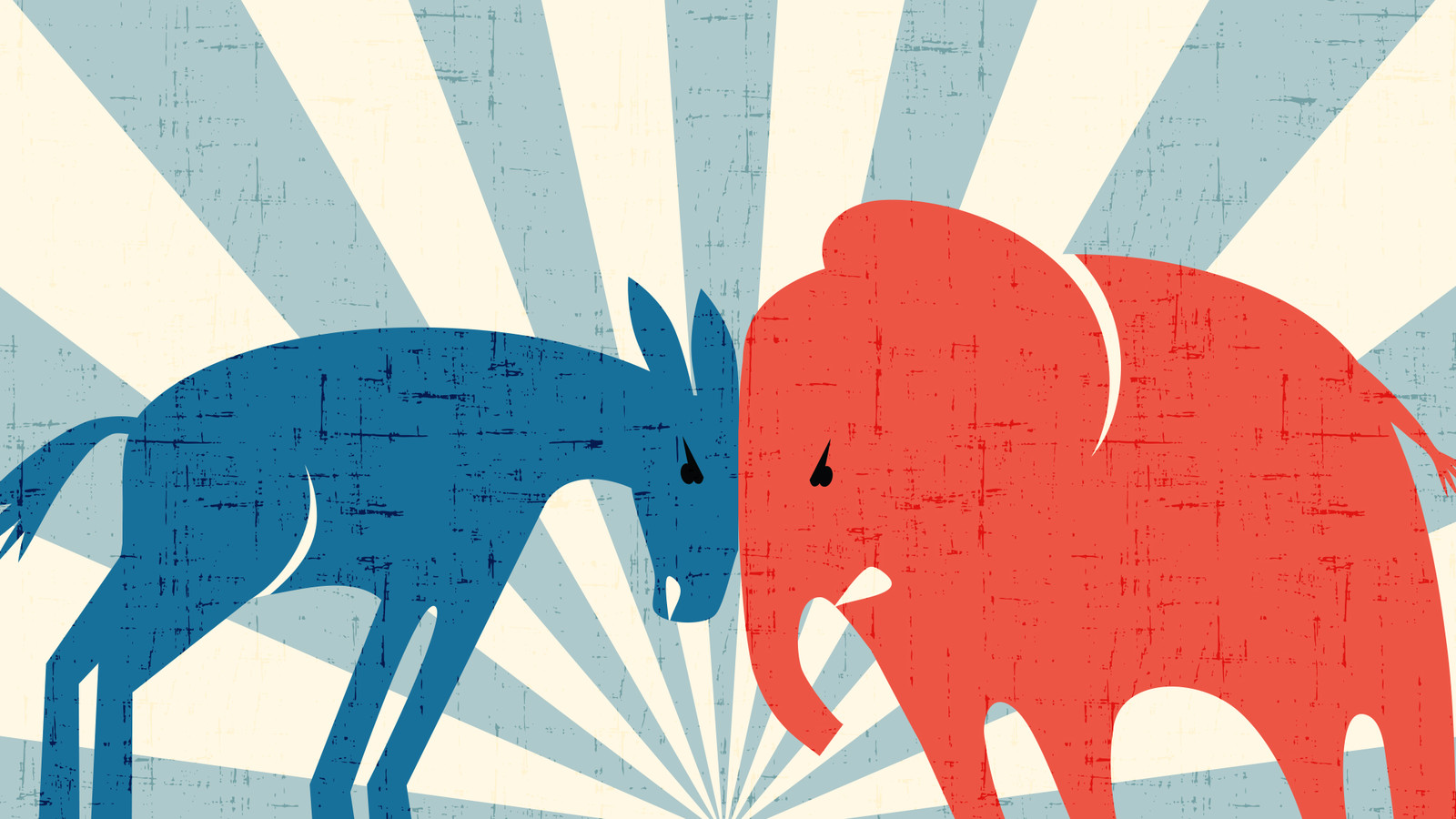
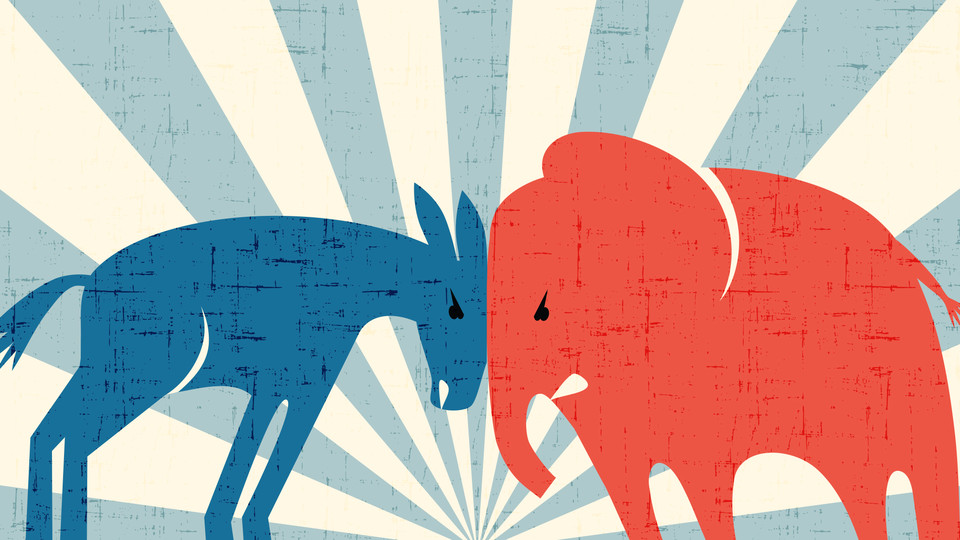
Flexible Morals: Why American Voters Support Divisive Misinformation
Over the last decade, concern has grown about American support for politicians who spread misinformation. Researchers attribute this trend to the “factual flexibility” of voters who accept fiction as fact — such as widespread support for Donald Trump’s unfounded claim that the 2020 election was stolen.
But a groundbreaking study shows there’s more to the story. Voters are not only factually flexible — they’re also “morally flexible.”
In a recent article published by the American Journal of Sociology, professors Minjae Kim (Rice Business), Ezra W. Zuckerman Sivan (MIT), Oliver Hahl (Carnegie Mellon) and Ethan Poskanzer (University of Colorado Boulder) find that voters often support politicians who spread divisive misinformation because it reflects a “deeper truth” that resonates with their beliefs and grievances.
“In short,” Kim says, “when the statement is by a Republican, Democrats insist the statement should be evaluated on its facts, whereas Republicans say what matters is the message. The reverse is true when the statement is by a Democrat.”
To arrive at their findings, the researchers conducted six surveys of American voters during the last years of Trump’s administration and in spring 2023 during Biden’s administration. Respondents evaluated divisive statements made by Trump, Biden and other politicians, focusing on issues like immigration, Black Lives Matter protests, the COVID-19 pandemic and Trump’s “Big Lie” about the 2020 election.
The surveys reveal that voters care more about “truth” with favored politicians and facts with disfavored ones. This effect is slightly stronger for Republicans, but it applies to Democrats, too.
Participants were shown a divisive, nonfactual statement verified by a fact-checking organization. They then rated whether it was based on objective evidence or impressions and whether truth or objective evidence was more important.
For instance, Trump supporters rated a false statement about a “caravan” of immigrants higher in truth than nonsupporters. A similar gap was seen in responses to an erroneous Biden claim about COVID vaccines. Biden voters justified the statement as appealing to patriotism during a crisis, valuing moral correctness over sheer factuality.
To really address the problem of misinformation and partisan bias, Kim, et al., highlight the role of “moral flexibility.” Interventions remain unclear, but first things first, they say. To make progress, we need to understand the problem.
Rice Business Wisdom
American voters hold opposing politicians to strict standards of factuality but support their favorite politicians as long as their statements express a “deeper truth” they support.
You May Also Like
Keep Exploring
Seeded for Success
Julian Duncan ’99 (BA), ’06 (MBA) discusses the seemingly small and insignificant moments that grew to become his passion, career and purpose.
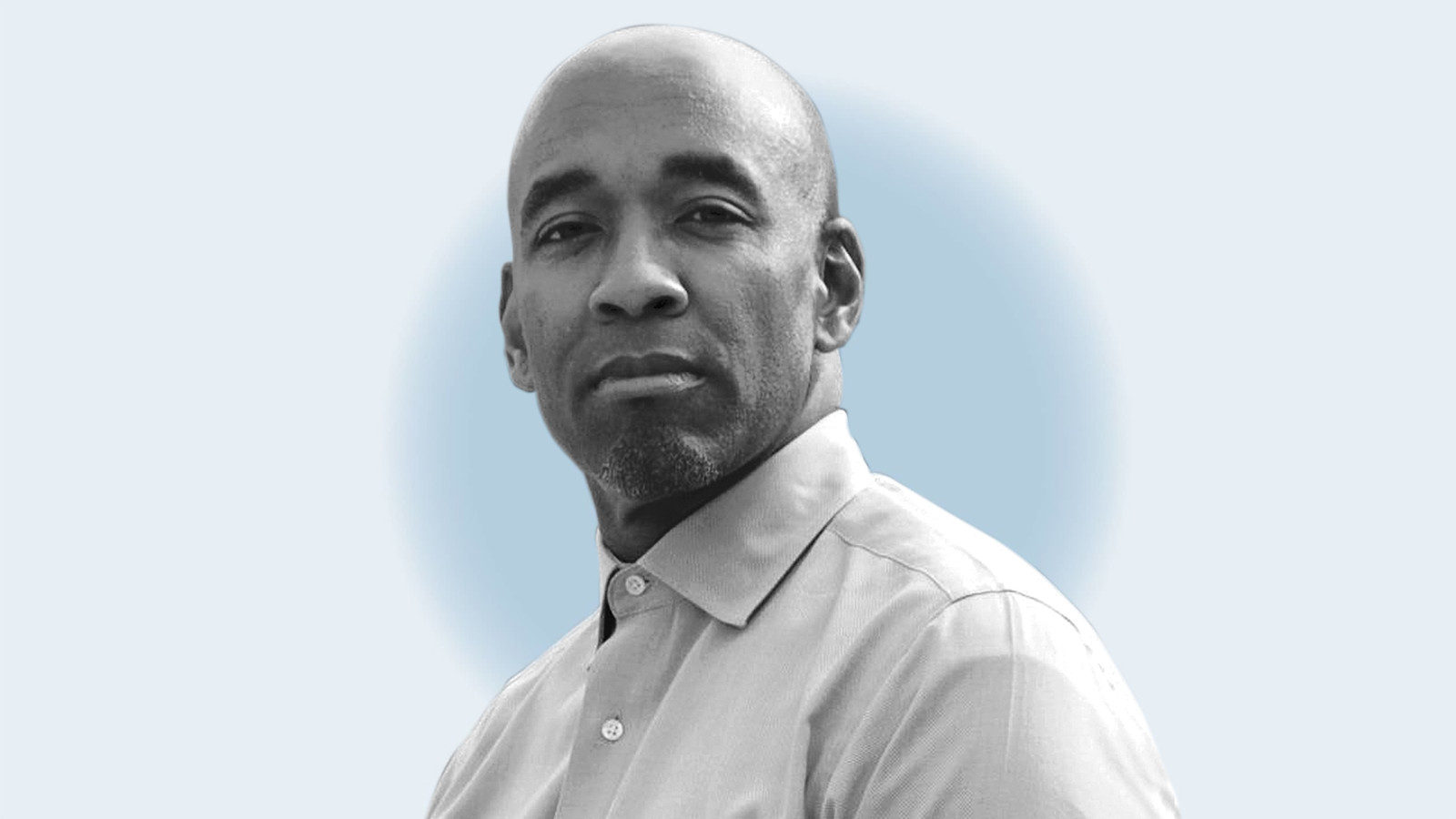
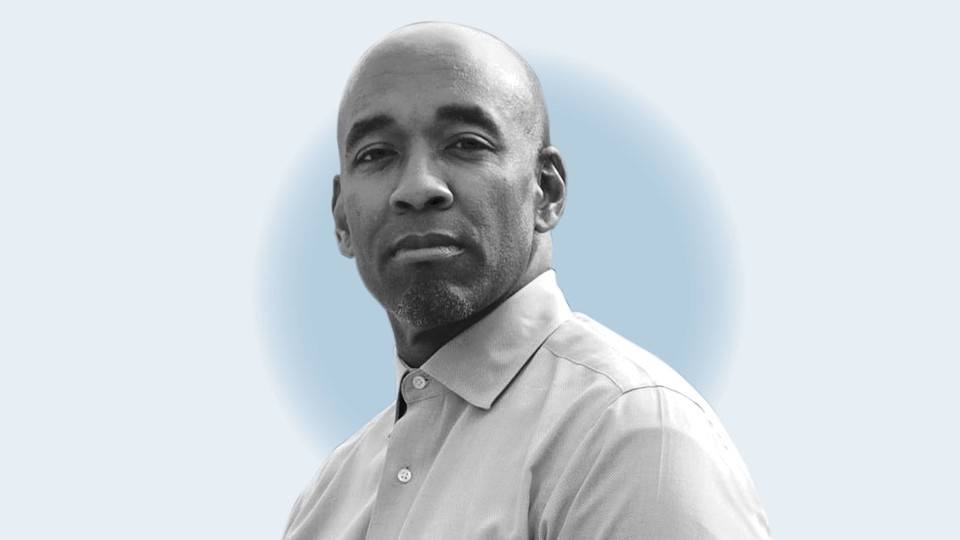
In his graduation ceremony address to the MBA Class of 2024, Julian Duncan ’99 (BA), ’06 (MBA) described the seemingly small and insignificant moments of his life that grew to become his passion, career and purpose.
In his graduation ceremony address to the MBA Class of 2024, Julian Duncan ’99 (BA), ’06 (MBA) described the seemingly small and insignificant moments of his life that grew to become his passion, career and purpose.
As a kid I attended an all-Black, inner-city private school that celebrated the traits and skills we demonstrated daily. One student’s certificate said “Artist,” while another’s said “Engineer.” Mine said “Leader.” It wasn’t as fun or easy to internalize as “Artist,” but I felt a sense of pride in this moniker. A seed was planted.
During summer months, I would spend weekdays at my grandparents’ house, which I loved doing because they always had great snacks and a big TV. I loved watching TV. My love for watching TV was only matched by my dread of playing outside. As I watched TV during the day, I began to notice patterns, specifically in advertising. I noticed that when cartoons ended and soap operas began, the commercials changed from GI Joe action figures and sugary cereals to household cleaning supplies and Calgon soap. I began to piece it together — certain people watch certain things at certain times, and companies use marketing to connect with them and sell them stuff. It was fascinating to me, even at a young age. Another seed.
Later, when I got to middle school, my PE coach told me to play football in seventh grade because I was kind of tall and kind of big. I blithely agreed — remember, playing sports outside was not my thing. After multiple botched attempts at putting on equipment, I went to my first football practice. Outside. In the heat. With 20 pounds of gear on. During that practice, I got absolutely crushed by an eighth grader. Not to mention, I couldn’t stop dry heaving after post-practice conditioning. Even so, I was hooked and rode the wave through high school varsity, the Rice Owl football team, NFL Europe and the Canadian Football League. Sports took me around the world and brought me joy. Yet another seed.
Much later in life, I found myself at Rice Business having a conversation with an advisor who asked the question, “Why are you here?” My response: “To increase my earning potential.”
The advisor said, “If that’s your sole reason, you may want to reconsider your place here.”
I was shocked.
But the advisor quickly kicked into mentor mode: “Once you earn the Rice Business MBA, you’ll be able to make money. But what you should consider is how to make money by doing something you love to do. Something you’re passionate about.”
Leadership. Marketing. Sports. All of a sudden, the seeds that were planted came together. From that point on, the challenge became finding the opportunity that made the best fit.
Thanks to my rigorous training at Rice Business, I was able to secure a spot in Nike’s coveted marketing rotational program, beating out hundreds of other MBAs. This opportunity led to a 10-year career with Nike, followed by becoming the first Black chief marketing officer of an NFL football team. And eventually, I returned home to Houston to serve as the chief marketing and strategy officer of my beloved Houston Rockets.
Throughout my life, I was challenged to discover what moved me and to connect it to a career pursuit. In each of those moments, a small spark of passion ignited something larger.
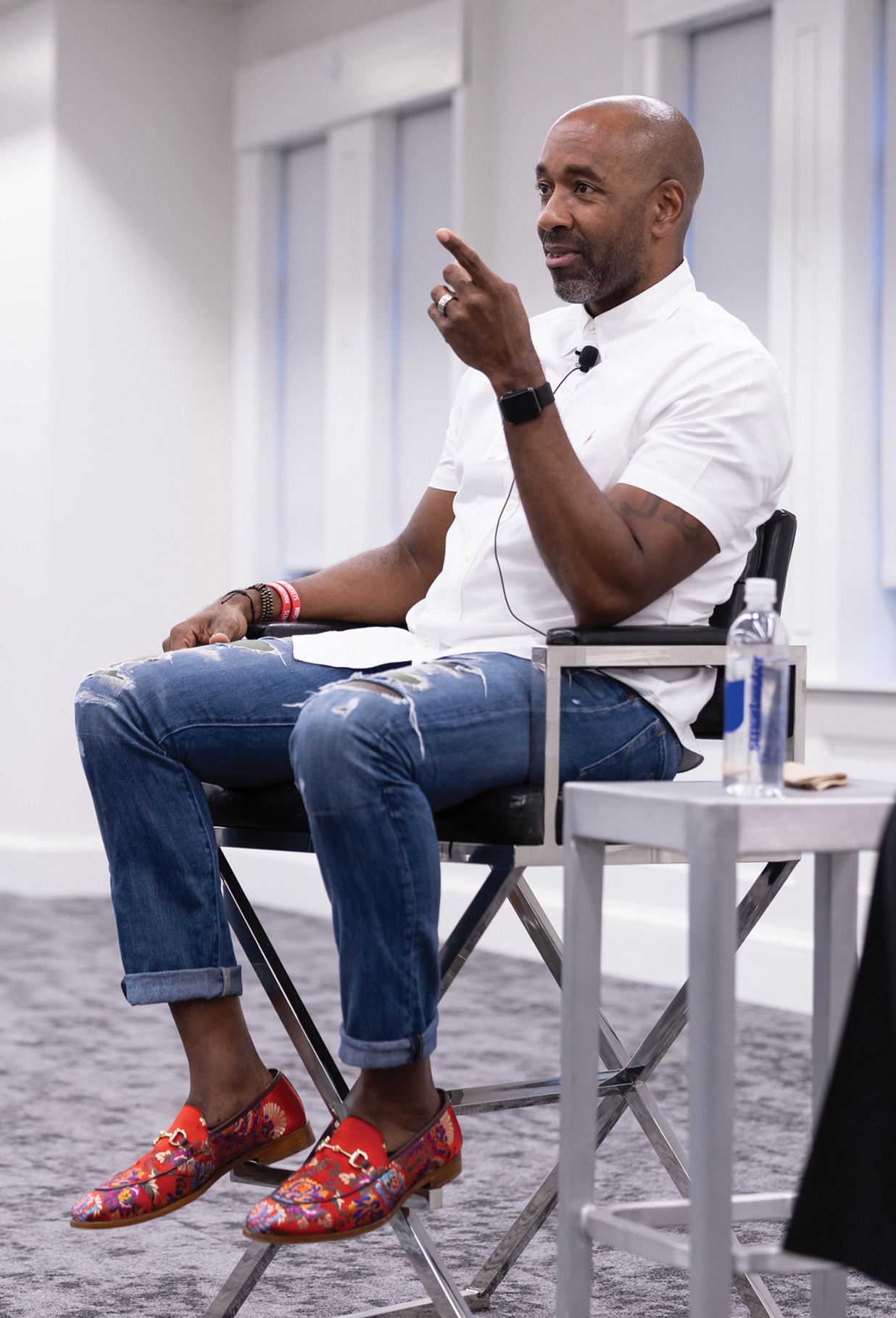
However, my career path needed more than passion to solidify. I also needed a sense of purpose. Something that extends beyond my day-to-day work.
For a decade, I worked at Nike with my best friend, Jabari. During that time, thanks to mentors, advocates and our hard work, we were fortunate to be in leadership rooms that mid-level employees typically had no access to. We weren’t always in those rooms at the same time, but we often had the shared experience of being the only Black people there. We talked often about this and expressed our desire to transform those spaces.
During the height of the pandemic, Jabari and I observed compounding events that disproportionately impacted Black people in corporate roles. Not only were Black individuals still not in the right rooms, but they also faced higher unemployment rates. And those who had jobs had to contend with heightened racial tension, which held our nation in both a figurative and literal chokehold.
From this crucible, a shared purpose emerged for me and my friend — to provide mentorship for people of color seeking to advance into leadership roles in corporate spaces. Sixteen years after Jabari and I first met, our “why” manifested in the form of Monday Night Mentorship, a collective of 5,000 people that we serve by providing curriculum, content and community. Together, Jabari and I are transforming the complexion of leadership, one mentee at a time.
As I reflect on my journey, I now recognize the seeds of leadership, marketing and sports that took root early on. Over time, they grew into a career that allowed me to break barriers.
Today, as I work to mentor and uplift others, I see the fruits of these seeds blossoming in the lives of those I serve. When you plant seeds with care, nurture them with passion and guide them with purpose, they can grow into something extraordinary.
Julian Duncan’s advice to early-career graduates
CONSIDER YOUR “WHY.” There’s a line in Shakespeare that says, “This above all: to thine own self be true,” which is vital to understanding one’s sense of purpose. When you know yourself and are true to yourself, the kaleidoscope of your life can sharpen into a clear and beautiful mosaic. The extraneous falls away, leaving you with a line of sight into your journey. That’s when you can begin asking yourself questions like “Where’s the need?” and “How can I deliver it?”
KNOW YOUR PEOPLE. Be conscious of other people’s humanity — your co-workers, employees, bosses, family and friends. Behind every widget and financial statement is a person who deserves your respect, yearns for your leadership and attention, or sometimes simply needs a listening ear. Meeting people where they are may be the most important responsibility of enterprise leadership. My father, John Duncan, aka “Pops,” is a multi-hyphenate creative who has imparted many things to me. One of the most poignant is an appreciation for people and the importance of connecting with them. He reminded me to keep it about the people because as leaders, we’re nothing without them.
TURN UP! CELEBRATE THE WINS! PARTY! Don’t be so tied up in things that you forget to acknowledge your accomplishments, however large or small. You’ll work hard and sacrifice for your wins. Be a source of energy that celebrates the wins as well as the lessons you learn from failure. They say misery loves company. You know what else loves company? Good energy! Vibes! People celebrate everything when they’re younger, it seems, but for some reason we fall away from celebrating as we get older. Don’t ignore or miss opportunities to be a party starter. Remember, a cheering stadium starts with one clap.
Keep Exploring
A 50th Birthday Party
In September, Rice hosted an Anniversary Gala to celebrate its 50-year legacy.

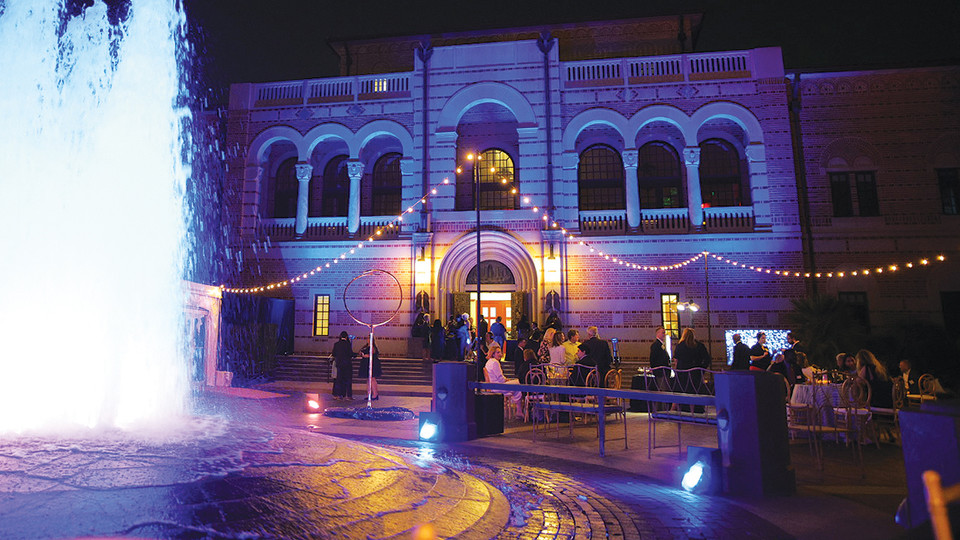
In September, Rice hosted an Anniversary Gala to celebrate its 50-year legacy. In an evening that included remarks from Rice Business and university leadership, cocktails, dinner, and even a “50th” ice sculpture and acrobats, the school walked through its history and looked to its future.
Rice Business is one of four schools at the university celebrating upcoming milestone anniversaries, with the business school being the first.
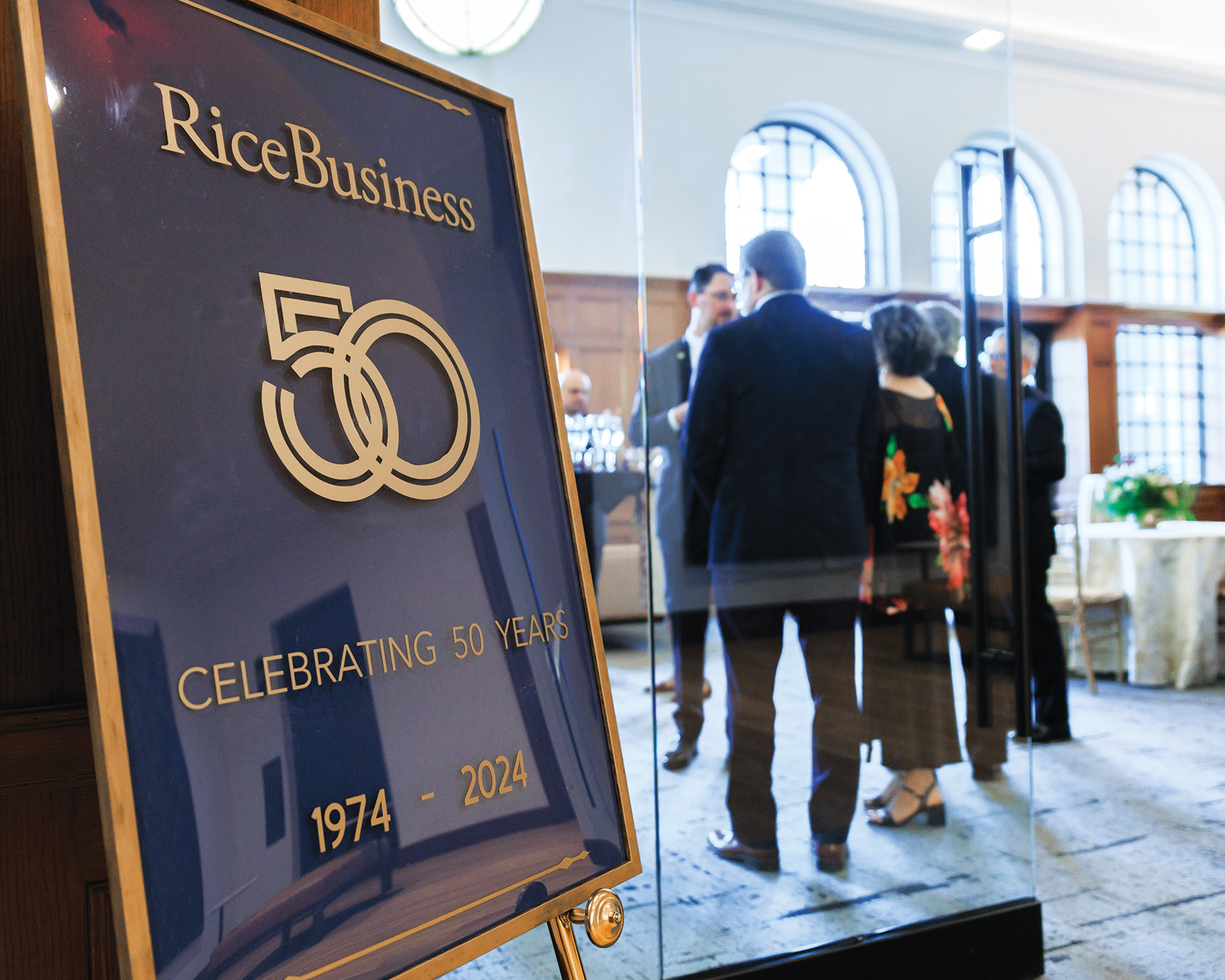
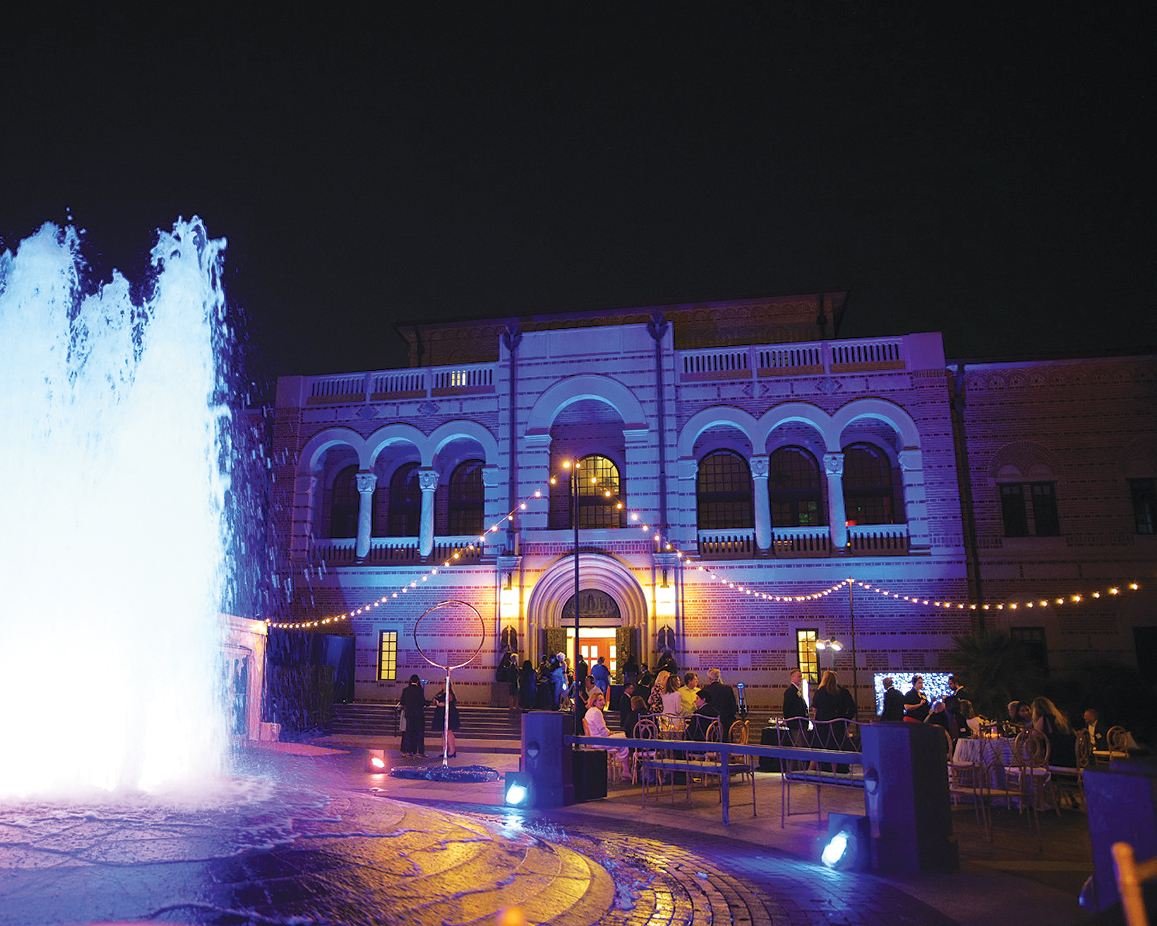
“Current business challenges must be met by critical thinkers trained by world-class researchers and supported by world-class research networks.”
Peter Rodriguez, Dean
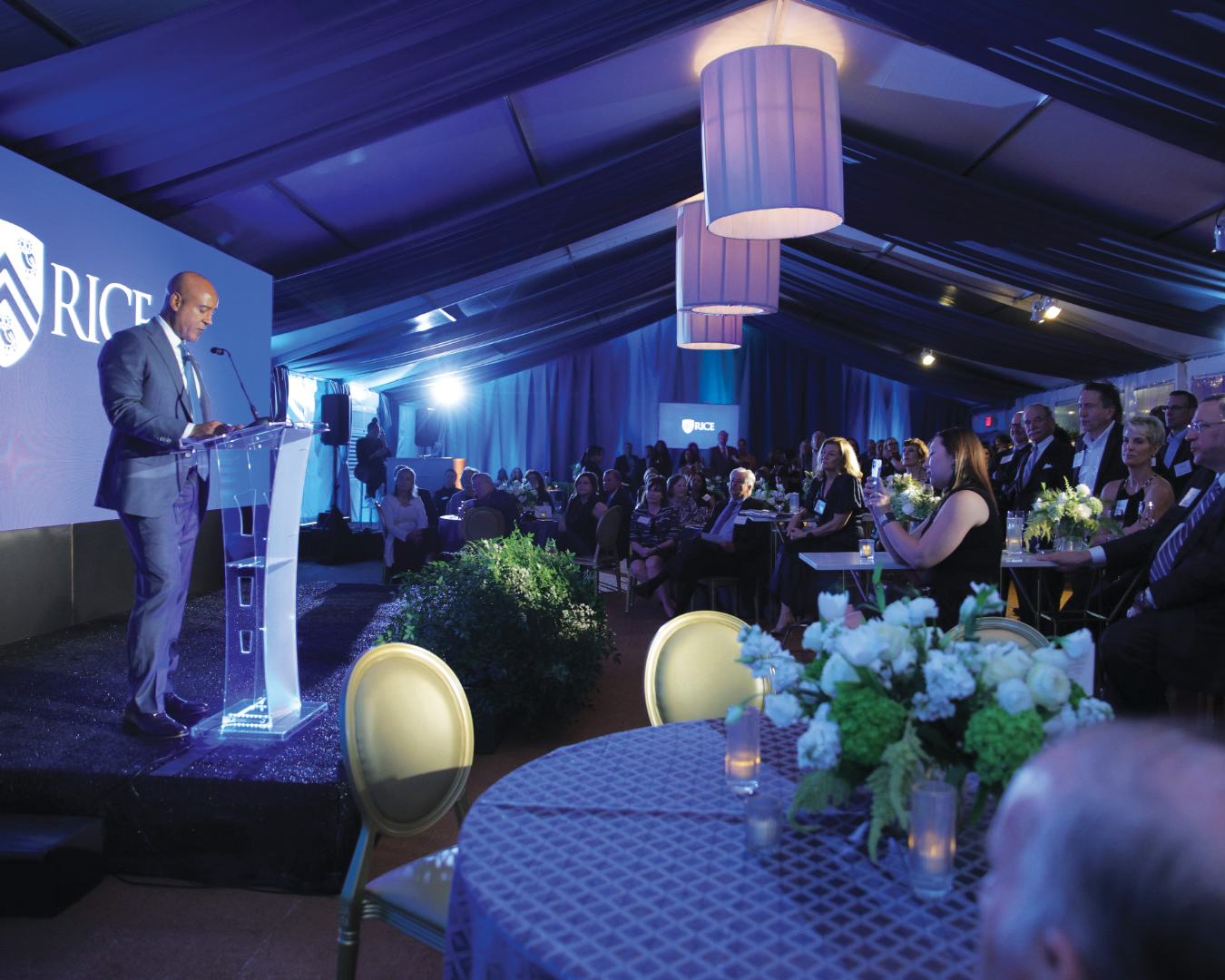
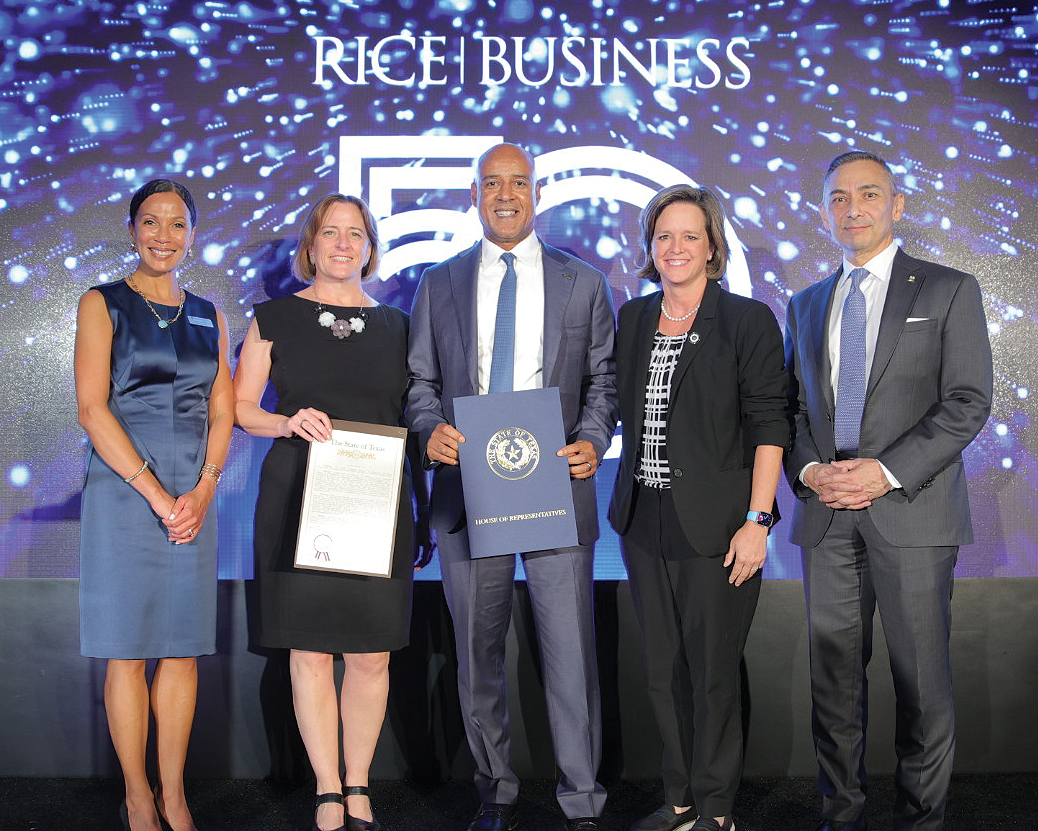
As we celebrate these important milestones, we not only honor the vibrant history of service and impact of these schools but also embrace the future with renewed vigor, Rice President Reginald DesRoches said. This academic year, as we embark on a new strategic plan, we are committed to building on and expanding this remarkable legacy, ensuring that Rice University continues to be a beacon of knowledge and creativity for generations to come.
Keep Exploring
Office Space
Inside the Office of Yan “Anthea” Zhang
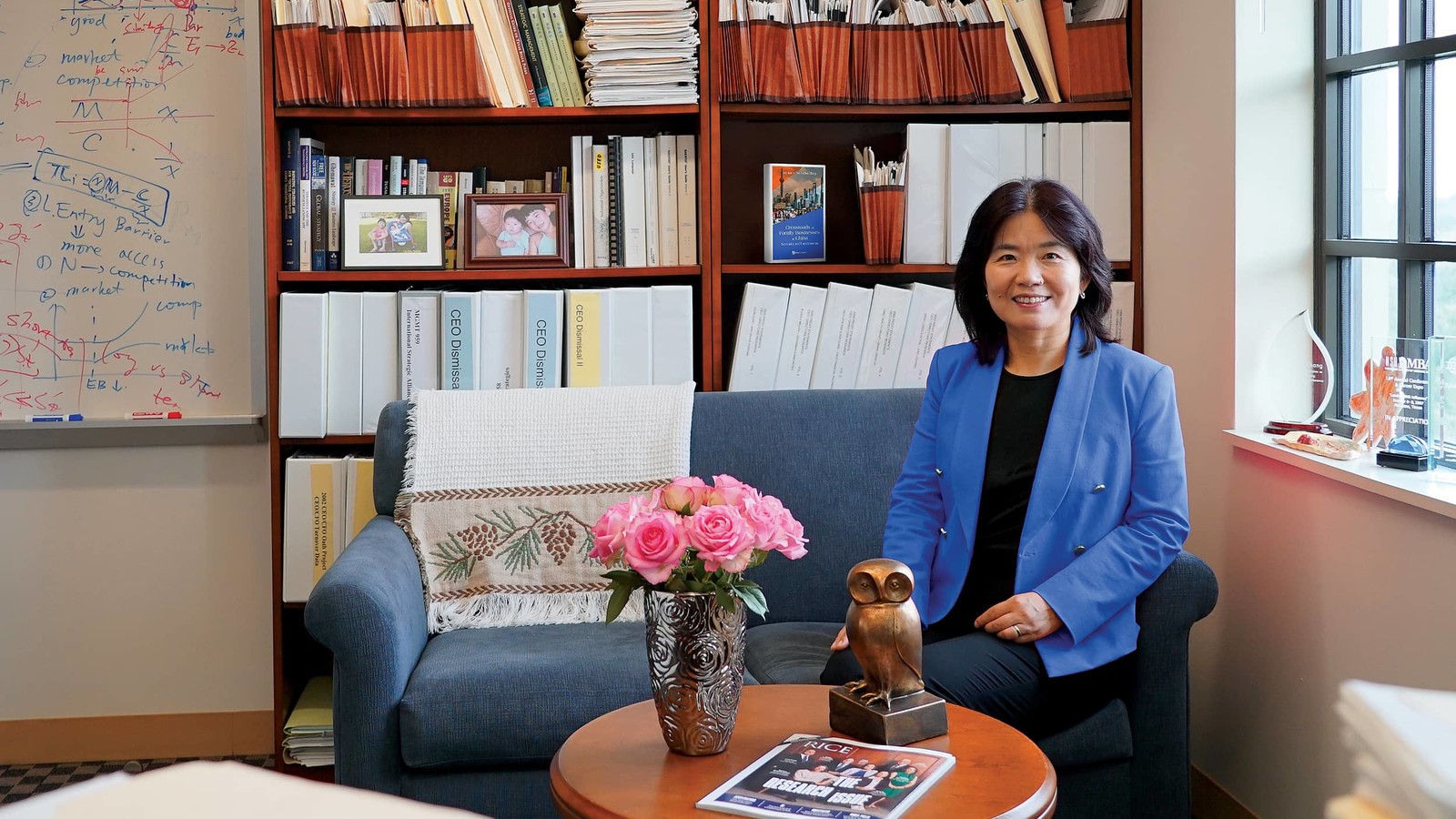
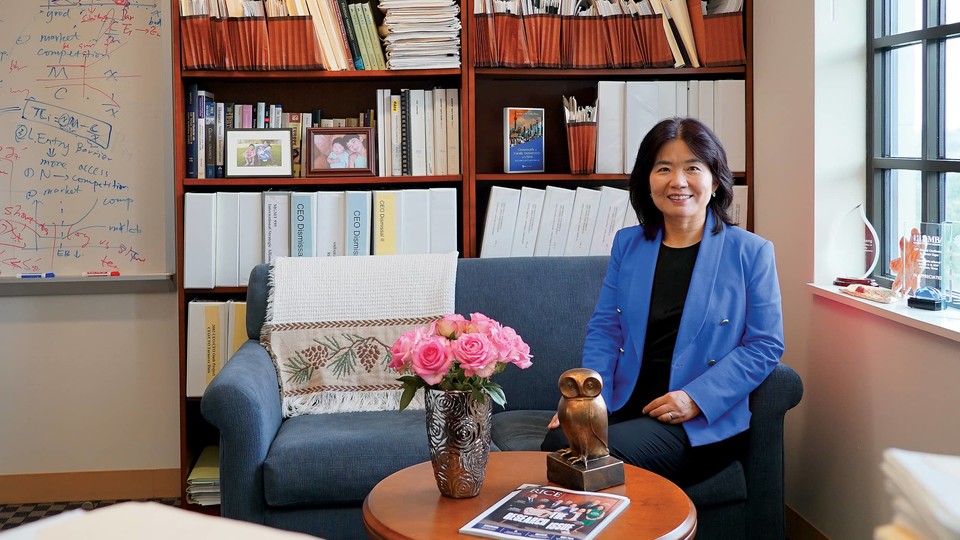
Inside the Office of Yan “Anthea” Zhang
Yan “Anthea” Zhang has spent her entire academic career at Rice Business, joining the school when it was still located in Herring Hall, after completing her Ph.D. at the University of Southern California.
The walls, shelves and cabinets of her office in McNair convey a love for her family with framed photos and art from when her children Sophia (an associate at Goldman Sachs Bank) and James (today a second-year student at Rice’s Brown residential college) were younger. A family photo also shows her husband, Haiyang Li, the H. Joe Nelson III Professor of Management. There are a lot of smiling faces in this room.
Students, visitors and colleagues can feel at ease when they stop by Zhang’s office, whether to chat or to exchange ideas from the comfy blue couch.
It’s also clearly a space where work gets done. Zhang uses the small whiteboard on her wall to work through modeling and logics with her Ph.D. students, and her shelves hold stacks of dataset documents, journals, articles and her recent book “Crossroads of Family Businesses in China: Succession and Transformation.”
2024 has been a professionally gratifying year for Zhang, professor and the Fayez Sarofim Vanguard Chair of Strategic Management and president of the Strategic Management Society. In April, she was elected to be a Fellow of the Academy of International Business (AIB), joining a prestigious group of scholars who have shaped the field of international business. She is also a Fellow of the Strategic Management Society. This semester, she is on sabbatical at INSEAD in France, where she’ll be continuing her research on female entrepreneurship in tech industries and succession issues in the context of family businesses.
